DashClicks Blog
The industry's top experts offer their best advice, research, how-tos, and insights—all in the name of helping you level-up your business and online marketing skills.
Join Us!

How Agencies Use White Label Facebook Ads to Drive Leads for Local Businesses
Facebook still commands the attention of billions of people every month. With more than three billion monthly active users, it remains one of the strongest digital channels for local lead generation. Even as new platforms rise, Facebook continues to offer unmatched reach, targeting precision, and creative flexibility for local service businesses.
For agencies, this creates a massive opportunity. Local companies depend on a steady stream of leads, and Facebook Ads has become one of the most reliable sources for affordable demand generation. The challenge is delivering consistent performance at scale. Many agencies want to offer Facebook ads services, but hiring senior talent, managing campaign complexity, and keeping up with creative testing can stretch teams thin.
This is where white label Facebook advertising steps in. It lets agencies provide high-performing, lead-focused campaigns without the burden of in-house fulfillment. In this guide, you’ll learn how agencies use the best white label Facebook ads to drive predictable results for local clients, plus tactical playbooks, KPIs to track, and packaging tips you can implement right away.
Why Small Agencies Struggle to Deliver Predictable Facebook Leads for Local Clients?
Running strong Facebook campaigns isn’t the issue; maintaining consistent performance for multiple clients is. Most small agencies juggle limited time, rising costs, and increasing expectations. Here’s why it becomes difficult to scale.
1. Limited Bandwidth for Ongoing Testing
Local lead campaigns require constant testing. Every market, city, and niche is different, and the only way to discover what works is through repeated experimentation. When one account executive handles ten or more clients, there’s no time to test new creatives, build new audiences, or fine-tune offers.
Imagine a single account manager responsible for plumbers, dentists, real estate teams, and cleaning services at once. Each niche needs unique messaging and fast iteration. Without enough hours in the week, campaigns slip into “maintenance mode,” and results eventually decline.
2. Tool and Creative Costs Escalate Quickly
Professional ad platforms, landing page builders, creative tools, call tracking, and optimization software add up fast. Producing steady creative variations also increases expenses. Local businesses usually have tight budgets, so agencies feel pressure to keep CPL low. According to WordStream, many local industries see average Facebook lead costs ranging from 15 to 60 dollars per lead. When CPL climbs, margins shrink.
3. Lack of Proven Local-Focused Creatives and Offers
Enterprise brands have huge creative libraries, but small agencies don’t. Local businesses rely on fast-turnaround content that feels authentic. A salon, roofing company, or home services provider needs visuals and offers that reflect local customer needs. Without a creative system, agencies end up reusing generic ads that fail to convert.
4. Inconsistent Tracking Setups Across Accounts
A solid tracking foundation is essential. Meta Pixel placement, event configuration, Conversions API, UTM structures, and lead quality checks often break when agencies grow too fast. If tracking is inconsistent, learning is limited, and optimization becomes guesswork.
5. Seasonal Demand and Cashflow Challenges
Local businesses often ride seasonal waves. HVAC, landscaping, tax preparation, and home maintenance all see spikes and dips. These businesses expect predictable lead costs year-round. Agencies without systematic testing and forecasting struggle to stabilize performance.
Further Reading: Seasonal Surge? How White Label Facebook Ads Teams Handle Holiday Promotions
6. Recruiting and Retaining Senior Paid Media Talent Is Expensive
Hiring skilled media buyers isn’t cheap. Research from CSVNOW shows agencies can save 15 to 30 percent by outsourcing specialized marketing functions. It’s difficult for smaller agencies to compete with larger teams on salary, training, and career growth. This becomes one of the biggest reasons agencies explore the best white label Facebook ads partners.
The result of all these challenges is simple: inconsistent performance. Agencies want to offer strong Facebook Ads services, but internal constraints make it hard to deliver at scale.
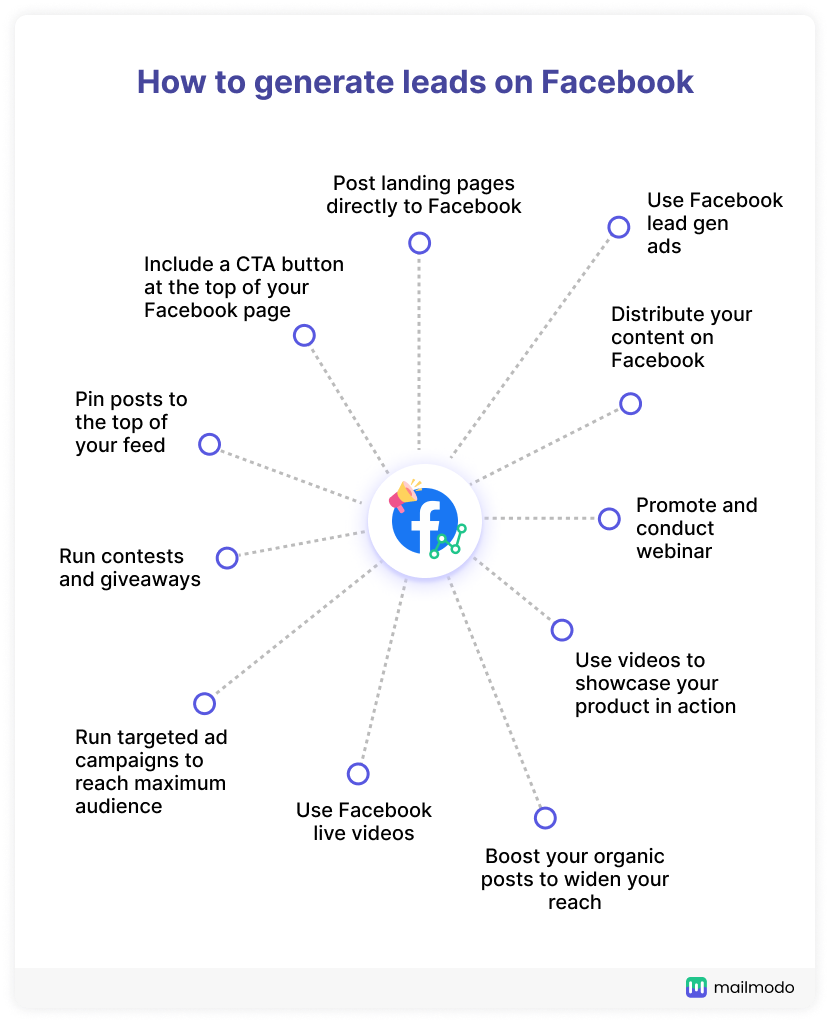
Image Source: MailModo
Here’s how white label Facebook Ads solves those problems.
White Label Facebook Ads Help Agencies Drive Leads for Local Businesses?
White label Facebook Ads fulfillment gives agencies the operational backbone they need to produce reliable results. Instead of worrying about hiring, training, or testing, agencies get a ready-made system managed by specialists.
Let’s break this down into capabilities, playbooks, measurement, and packaging.
A. Core Capabilities White Label Partners Provide
A strong white label partner becomes an extension of the agency. They provide:
- Dedicated Paid Media Strategists: Senior-level media buyers who understand local campaigns, testing cycles, and optimization priorities.
- Creative Production Support: Access to video, UGC, and static ad production tailored to local service niches.
- Audience Research and Buildouts: Custom audiences, lookalikes, interest stacks, radius targeting, and retargeting frameworks built for local intent.
- Technical Setup and Tracking: Meta Pixel, Conversions API, server-side events, and proper event mapping.
- Lead Quality Checks and CRM Integrations: Automated routing using tools like Zapier, LeadsBridge, DashClicks’ CRM software, or native APIs.
- Branded Dashboards and Reporting: White-labeled insights that the agency can share directly with clients, like DashClicks’ White Label Dashboard software.
These capabilities create predictable delivery, faster test cycles, and leaner operational costs. With outsourcing, saving 15 to 30 percent on specialized tasks, agencies maintain strong margins while delivering better performance.
B. Tactical Playbooks That Deliver Local Leads
Below are proven playbooks agencies can use through white label fulfillment partners. Each is designed to run efficiently across multiple clients.
1. Fast-Start Local Lead Funnel
Ideal for service-based businesses like cleaning companies, home repair services, or small clinics.
Steps:
- Build a radius-based target audience with local interest layers.
- Launch ads promoting a direct incentive, such as free estimates or small discounts.
- Use Instant Forms or a simple landing page.
- Push leads directly to CRM with auto-SMS follow-up.
KPIs:
- CTR Target: 1.5 to 3 percent
- CPL: benchmarked against WordStream industry averages
- Lead Response Time: under 5 minutes
Sprout Social reports that short-form video and mobile-friendly paid ads remain among the most effective formats for engagement, reinforcing the value of this funnel.
2. Appointment Push for High-Ticket Local Services
Used for dentists, chiropractors, med spas, and salons that rely on booked appointments.
Steps:
- Run a 45–60 second testimonial or demo video.
- Send traffic to a calendar booking page.
- Integrate automated reminders through SMS or email.
KPIs:
- CPL vs. CPA to book an appointment
- Appointment rate
- Cost per qualified lead (CPQL)
This playbook focuses less on sheer volume and more on qualified intent.
3. Multi-Location Rollout Playbook
Useful for franchises, multi-office businesses, and expanding brands.
Steps:
- Build geo-structured campaigns for each location.
- Use location-specific landing pages.
- Deploy bulk creative variations with local angles.
- Implement GA4 templates and consistent UTM naming.
Metric: CPL stabilizes within the first two weeks once the template is active.
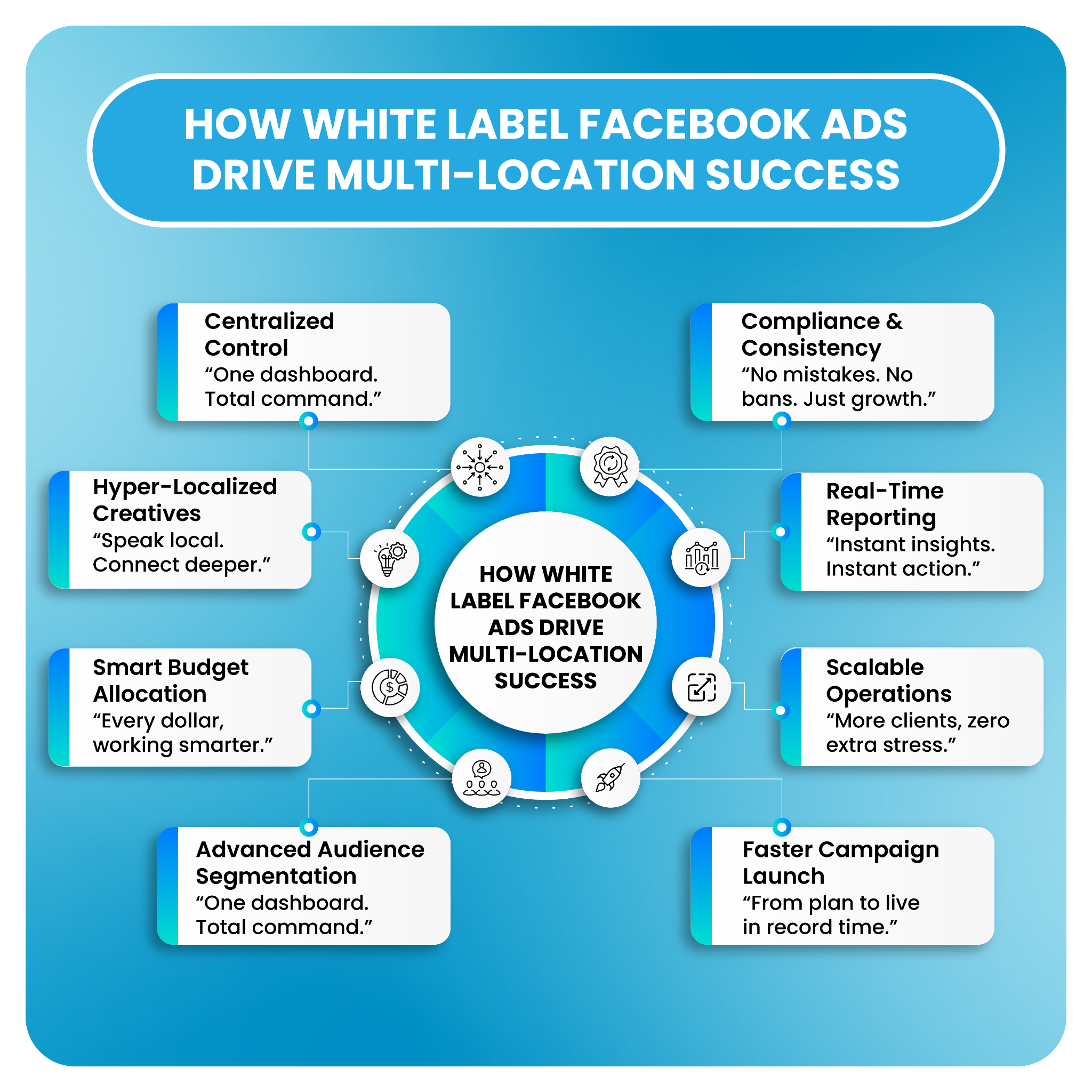
4. Quick-Response Lead Routing
Best for industries where speed matters, such as towing, HVAC, or urgent care.
Steps:
- Push leads to reps instantly.
- Trigger auto-SMS within seconds.
- Set up real-time call routing.
Studies show that contacting a lead within five minutes increases the chance of conversion dramatically compared to a 10-minute delay.
In one modeled example, a three-location home services business boosted lead volume by 2.4 times while reducing CPL by 18 percent after implementing faster routing and structured templates.
C. Creative and Offer Frameworks that Convert Locals
Local audiences respond to clarity, authenticity, and relevance. Strong frameworks help agencies scale creative testing.
Local Proof Triggers:
- Reviews from neighborhood customers
- Before-and-after photos
- Local statistics or seasonal insights
Offer Templates:
- First-visit discounts
- Free mini-audits
- Limited-time local deal
Proven Hooks for Short Videos:
- “Most people in [city] don’t know this…”
- “Here’s how to fix this common issue at home…”
- “A quick tip from a local expert…”
WiserNotify reported that 65 percent of marketers used paid ads to drive leads in the last year, showing the ongoing importance of fresh creatives.
A simple A/B cadence might include three creatives across two audiences, refreshed weekly.
D. Tracking, Attribution, and Lead Quality
Accurate tracking ensures you aren’t optimizing blind.
Essential Setups:
- Facebook Pixel
- Conversion API
- Server-side events
- Offline conversions (especially for appointment-heavy businesses)
- CRM mapping
- Lead scoring
KPIs to Watch:
- Leads
- Qualified leads
- CPQL
- Appointment rate
- Lead response time
- Customer Lifetime Value per customer
- Campaign ROAS
According to WordStream’s industry benchmarks, Facebook is often cheaper for local lead gen compared to search ads, especially for home improvement, beauty services, and personal care.
Tracking should measure customer actions beyond the form submission. The real metric is cost per booked job or appointment.
E. Packaging, Pricing, and Margins for Agencies
A clear pricing structure helps agencies maintain healthy margins.
Common Service Tiers Include:
- Starter: basic campaign setup, simple creatives, monthly reporting
- Growth: ongoing testing, landing pages, advanced creative support
- Enterprise Local: multi-location support, frequent creative updates, CRM consultative support
Pricing Models:
- Flat Retainer
- Percentage of Ad Spend
- Hybrid Structure
Many agencies prefer a retainer plus spend pass-through because it keeps monthly revenue predictable.
Example: If white label fulfillment and creative cost $1,200 per month and the agency charges the client $2,400, the agency earns a solid margin while delivering premium service. Outsourcing savings help maintain a competitive price while still offering advanced capabilities.
F. Onboarding and Retention for Local Clients
Getting clients set up the right way reduces churn and sets expectations.
Onboarding Checklist:
- Access to Business Manager and CRM
- Local business market research
- Baseline audit
- 90-day plan with testing cycles
Retention Tips:
- Monthly reporting that explains outcomes in simple language
- Consistent creative refreshes
- Adding services like local SEO, SMS nurturing, or retargeting funnels
A clear roadmap keeps clients confident during seasonal fluctuations.
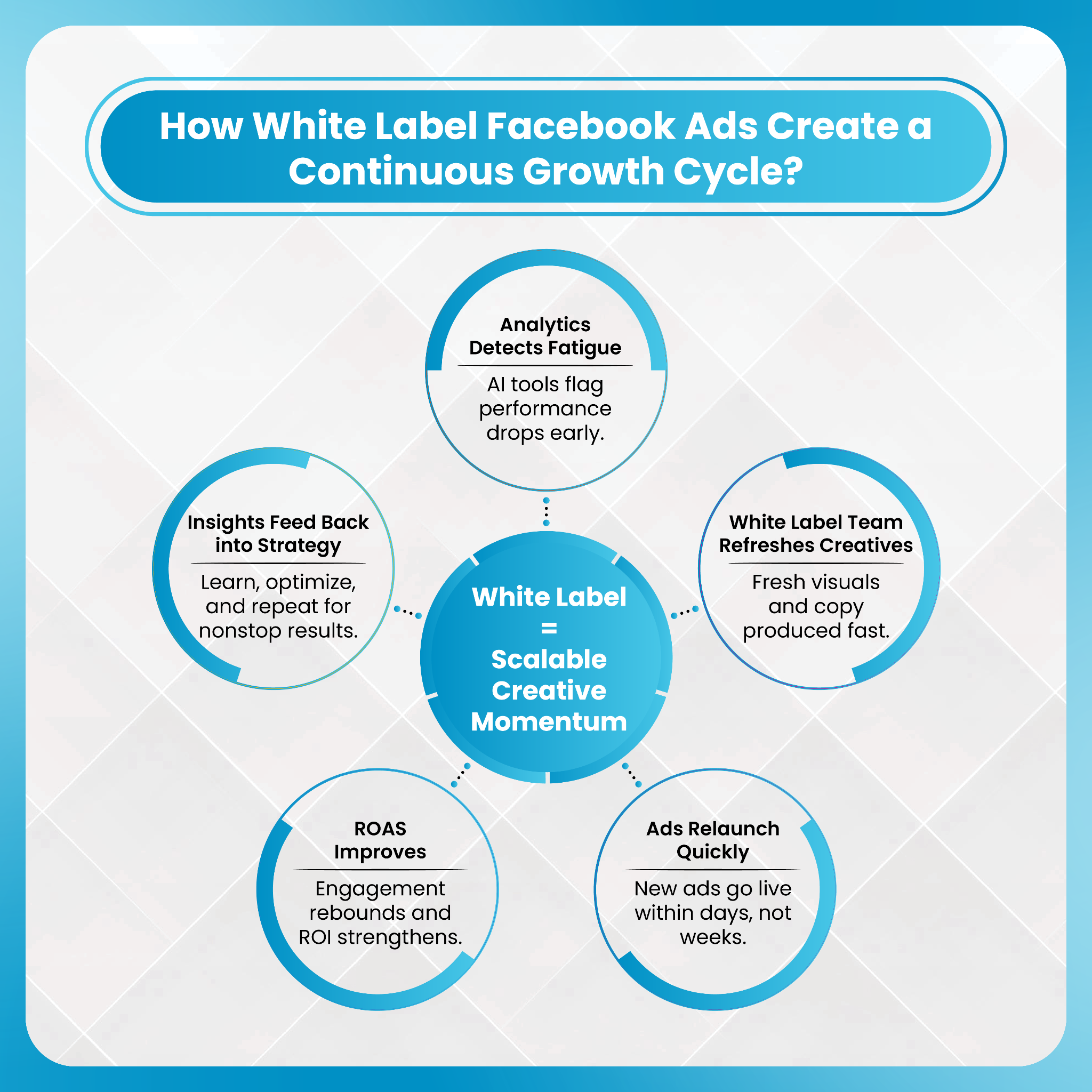
Case Study Walkthrough: A Modeled Local Lead Generation Example
A home renovation company serving a mid-sized city wanted more high-quality leads but struggled with rising CPC and inconsistent creative performance. Their initial CPL was 45 dollars, which put pressure on margins.
What the Agency Did with White Label Facebook Ads Support:
- Ran radius-based targeting focused on homeowners.
- Launched three new UGC video ads plus two static variations.
- Built a landing page with a limited-time estimate offer.
- Set up Conversions API for more accurate tracking.
- Integrated instant CRM routing with SMS follow-up.
- Implemented a five-minute lead response rule.
Results Over 90 Days:
- CTR increased from 1 percent to 2.8 percent.
- CPL dropped from 45 dollars to 32 dollars.
- Lead-to-appointment rate improved with faster response times.
- Conversion to paid jobs increased due to consistent follow-up.
These improvements aligned with WordStream benchmarks for home improvement lead costs, making the performance realistic and credible. With consistent creative testing and proper routing, the agency stabilized results and achieved predictable monthly lead flow.
Quick Tactical Checklist for Agencies
Here’s a simple list agencies can use immediately:
- Set up Meta Pixel and Conversions API correctly.
- Build two audiences to test every cycle.
- Launch at least three creative variations.
- Use a clean UTM structure.
- Ensure leads route to CRM within minutes.
- Set up SMS and email auto-responses.
- Build a local landing page with a clear offer.
- Refresh creatives every 7 to 14 days.
- Track leads past the form into actual appointments.
- Run a monthly analysis on performance by campaign and audience.
These steps help stabilize lead flow and improve long-term performance.
How DashClicks Helps Agencies Implement Effective Facebook Ads Campaigns?
DashClicks gives agencies an end-to-end platform for managing, fulfilling, and scaling Facebook advertising campaigns for local businesses. Instead of juggling scattered tools, agencies get a central dashboard where everything from onboarding to reporting flows seamlessly.
The white label Facebook advertising team handles audience research, technical setup, creative production, campaign optimization, and performance reporting. This allows agencies to offer high-quality Facebook ad services without hiring in-house specialists or managing complicated workflows.
DashClicks also provides automated lead routing, conversion tracking, and CRM integrations so clients get fast follow-up and higher conversion rates. For agencies ready to expand their local lead generation services, DashClicks delivers a scalable fulfillment system backed by experienced media buyers and proven processes.
Conclusion
White label Facebook Ads give agencies a powerful way to deliver steady, scalable lead generation for local businesses without expanding internal teams.
By partnering with specialists, agencies gain access to expert optimization, fresh creative testing, better tracking, and a predictable operational system. This makes it easier to serve more clients, maintain strong margins, and offer high-quality results in competitive local markets.
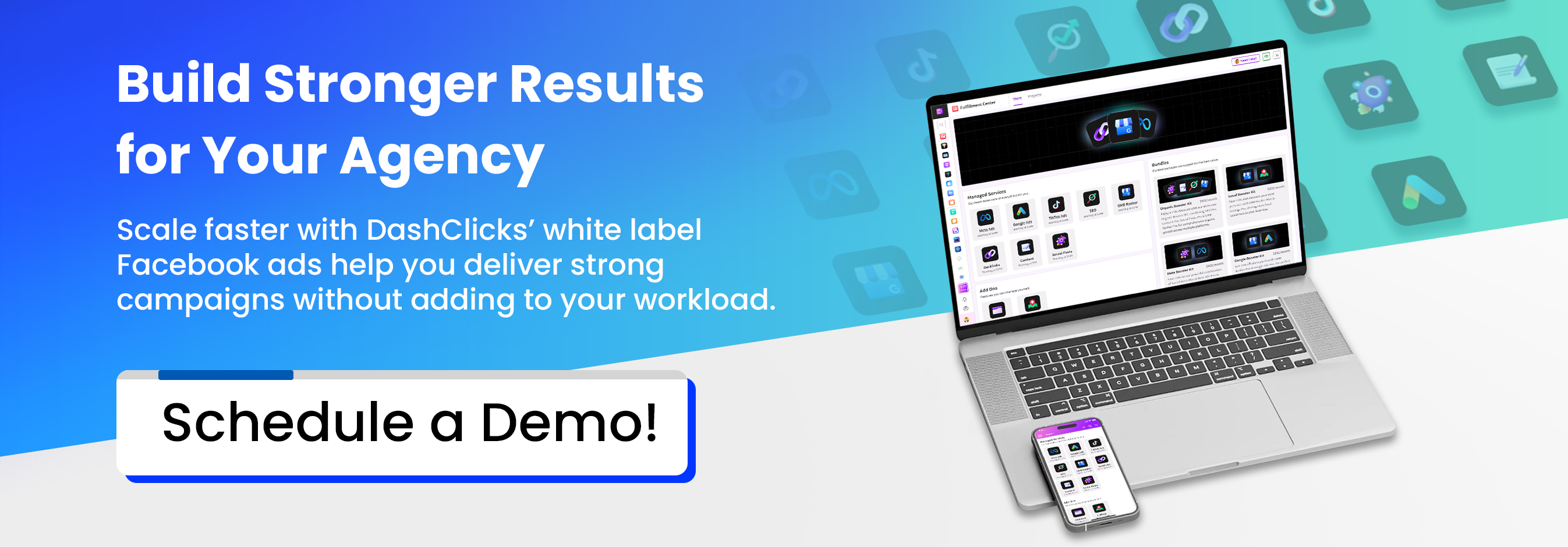

How Small Agencies Use White Label SEO to Compete with Enterprise Agencies
In today’s competitive digital marketing world, small agencies are under more pressure than ever to match the output of much larger firms. Clients expect advanced SEO strategies, detailed reporting, quick turnaround times, and results that show steady progress. These expectations keep rising as the SEO landscape itself grows.
Recent industry data shows just how fast the market is expanding. According to Mordor Intelligence, the global SEO services sector was valued at about USD 74.9 billion in 2025 and is projected to climb to USD 127.3 billion by 2030. This kind of growth brings a mix of opportunity and challenge. Clients are spending more on SEO, which opens the door for agencies to grow their revenue, but it also means those same clients expect a higher level of expertise, consistency, and scalability.
Outsourcing has become a major factor in how agencies adapt. The knowledge process outsourcing market, which includes specialized services like SEO, is expected to reach more than USD 211 billion by 2030. This rise isn’t accidental. Small and mid-sized agencies are relying more on external specialists to handle complex or time-consuming tasks. By doing this, they can keep up with workloads, improve the depth and quality of their delivery, and stay competitive in pitches. Instead of hiring full-time team members for every skill set, outsourcing gives them access to experienced professionals when they need them. The result is the ability to operate with the efficiency of a larger agency without carrying the overhead of one.
The demand for SEO itself remains strong across industries. Research from Conductor shows that nearly all organizations see clear, measurable impact from their SEO efforts, whether through increased organic traffic, stronger engagement, or higher conversion rates. For agencies, this makes SEO one of the most reliable services for long-term retention and recurring revenue. When clients see consistent organic growth, they stay longer and often expand their services.
The challenge for many smaller agencies is delivering that level of enterprise-grade SEO on a consistent basis. It requires time, tools, expertise, and a team that can scale as client needs grow. That’s where white label SEO becomes a practical solution. Instead of spreading their internal team thin or turning away business, agencies can partner with a white label provider who handles strategy, execution, reporting, and optimization behind the scenes. This allows them to offer high-quality SEO under their own brand while maintaining the output, depth, and reliability that clients expect from larger firms.
As the SEO market continues to grow and client expectations evolve, white label SEO partnership are becoming one of the most effective ways for smaller agencies to stay competitive, expand their capabilities, and deliver results that truly stand out.
What Small Agencies Face Compared to Enterprise Agencies?
Running a full SEO operation requires a lot of specialized roles. A small agency often doesn’t have the budget to hire technical SEO experts, trained writers, link builders, and strategists. Recruiting top-tier talent can take months and usually comes with high salaries.
Beyond staffing, there’s a technology gap. Enterprise agencies utilize premium crawling tools, AI-powered analysis platforms, automation stacks, and reporting software that can cost thousands of dollars each year. Smaller teams may rely on basic tools, which makes it harder to compete.
Then there's scale. Handling multiple SEO clients at once takes strong systems, consistent quality control, organized project management, and ongoing optimization. Many small agencies struggle once client volume increases or projects become more complex, especially with multi-location businesses.
Clients today also expect clear communication, transparency, and fast results. They want ongoing insights, accurate monthly reporting, and strategic recommendations. Meeting these expectations can be difficult for lean teams.
Quality inconsistency is another concern. Junior staff or freelancers may deliver variable output, which risks damaging results and client trust. Because of all this, outsourcing becomes economically attractive.
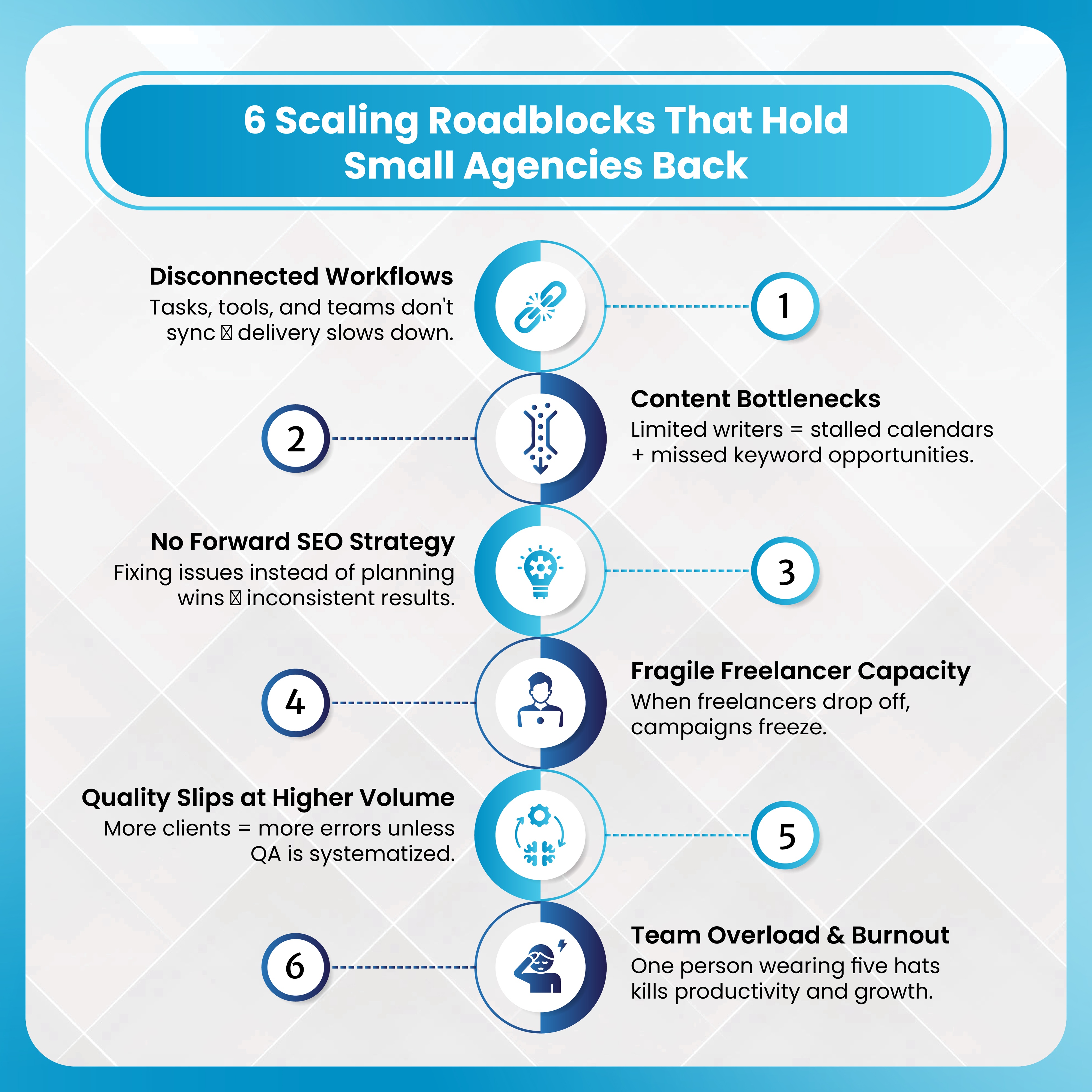
Studies like those from Hire with Near show that outsourcing can reduce costs by 30–70% compared to in-house hiring, making it a practical solution for smaller agencies that need reliable performance.
How White Label SEO Levels the Playing Field?
White label SEO lets smaller agencies operate at the same level as bigger firms without increasing overhead. Instead of hiring specialists, they lean on an external team that works behind the scenes while everything stays under the agency’s brand. This setup gives them the skill, capacity, and structure they need to take on more clients and offer a broader range of services.
1. What White Label SEO Provides?
A good white label partner brings senior-level expertise across all the major areas of SEO. This includes technical work like crawl optimization and site performance, as well as content strategy and link acquisition. Agencies also get access to premium tools that would be expensive to buy on their own.
Another advantage is speed. They can onboard new clients quickly because the fulfillment team already has established workflows. Predictable SLAs give agencies the confidence to promise steady delivery and consistent results.
2. Capabilities Agencies Gain
With a white label SEO provider, agencies can offer services that normally require a full in-house team. These often include:
- Deep technical audits, solutions for crawl and indexation issues, and improvements to site speed.
- Scalable content strategies built around topics, clusters, briefs, and quality production.
- Manual link acquisition from reliable publishers.
- Support for multi-location SEO for clients, including site structure and landing page strategy.
- Branded dashboards and automated reporting that look like they came from the agency’s own team.
A practical example shows how powerful this model can be. A small three-person agency once partnered with a white label SEO provider to execute a six-month content program for a regional franchise. The franchise saw its organic traffic triple, and the agency kept a 40 percent margin on the work. Achieving something like this alone would have required multiple hires and far more bandwidth.
3. Measurable Business Outcomes
White label SEO can lead to faster, more reliable results because the work is handled by teams that specialize in execution. Many clients see ranking improvements within three to six months. Costs stay low because agencies don’t have to pay salaries, benefits, or tool subscriptions, which often leads to savings between 30 and 70 percent.
Retention also increases since SEO is an ongoing service that compounds over time. Strong deliverables help agencies compete for larger contracts and pursue enterprise-level opportunities that would otherwise be out of reach.
4. Packaging and Pricing White Label SEO
A tiered structure is one of the easiest ways to package these services. Agencies often set up plans such as:
- Starter options with a small keyword set and basic deliverables.
- Growth plans with stronger content production and link building.
- Advanced packages that include technical audits, link acquisition, and more strategic work.
Margins typically fall between 40 and 70 percent, depending on how much value the agency adds on top. Clear expectations around SLAs, review cycles, and reporting are important for smooth delivery. Once the results start to show, upselling becomes natural. Agencies can add content, local SEO, or conversion-focused audits without hiring new staff.
5. Operations and Workflow Management
Running white label SEO effectively comes down to having clean internal processes. Onboarding should include access collection, goal setting, an initial audit, and a clear timeline.
Regular quality checks help keep content and link-building standards consistent. Monthly reporting gives agencies a chance to explain progress and strengthen client relationships. Good NDAs and security practices keep the partner invisible and ensure the agency’s brand remains front and center.
By integrating white label SEO into their operations, small agencies can scale confidently, take on bigger challenges, and deliver results that stand up against the industry’s leading firms.
How Small Agencies Win Enterprise Clients?
White label SEO agency improves more than delivery. It also strengthens how a small agency presents itself in the market:
- Enterprise-level audits, structured documentation, and detailed reporting help the agency appear more established and experienced.
- Clients notice the shift right away because they see deeper analysis, stronger technical insights, and strategies that resemble work from a large in-house SEO team.
- The credibility boost is significant since a white label SEO partner provides systems, SOPs, and case studies that the agency can use in prospecting and proposals.
- Agencies can confidently approach bigger opportunities, including national brands, multi-location businesses, and complex websites.
- Proposal writing becomes easier with ready-made frameworks for technical breakdowns, keyword forecasting, competitive insights, and long-term content planning.
- These elements make the agency look like a specialized SEO partner rather than a small local provider.
- The quality of the proposal itself becomes a differentiator because enterprise clients expect depth and clarity.
- Using white label SEO in both delivery and positioning helps small agencies compete in higher-value markets without growing their internal team.
The Margin Engine Behind White Label SEO
- White label SEO services help agencies improve margins by replacing full-time hires with pay-as-needed fulfillment.
- The cost of one senior SEO employee can equal an entire month of white label work, especially once tools, training, and management time are included.
- In-house teams come with fixed, ongoing expenses such as salaries, software, and employee development.
- White label SEO fulfillment removes most of that overhead and lets agencies scale work up or down based on client demand.
- Tiered retainers give agencies predictable fulfillment costs and make it easier to maintain strong margins.
- This predictability supports steady growth and better financial planning.
- With fulfillment handled in the background, agencies can focus on cross-selling services like PPC, web development, and branding.
- SEO becomes the backbone of higher retention, more upsells, and stronger profitability.
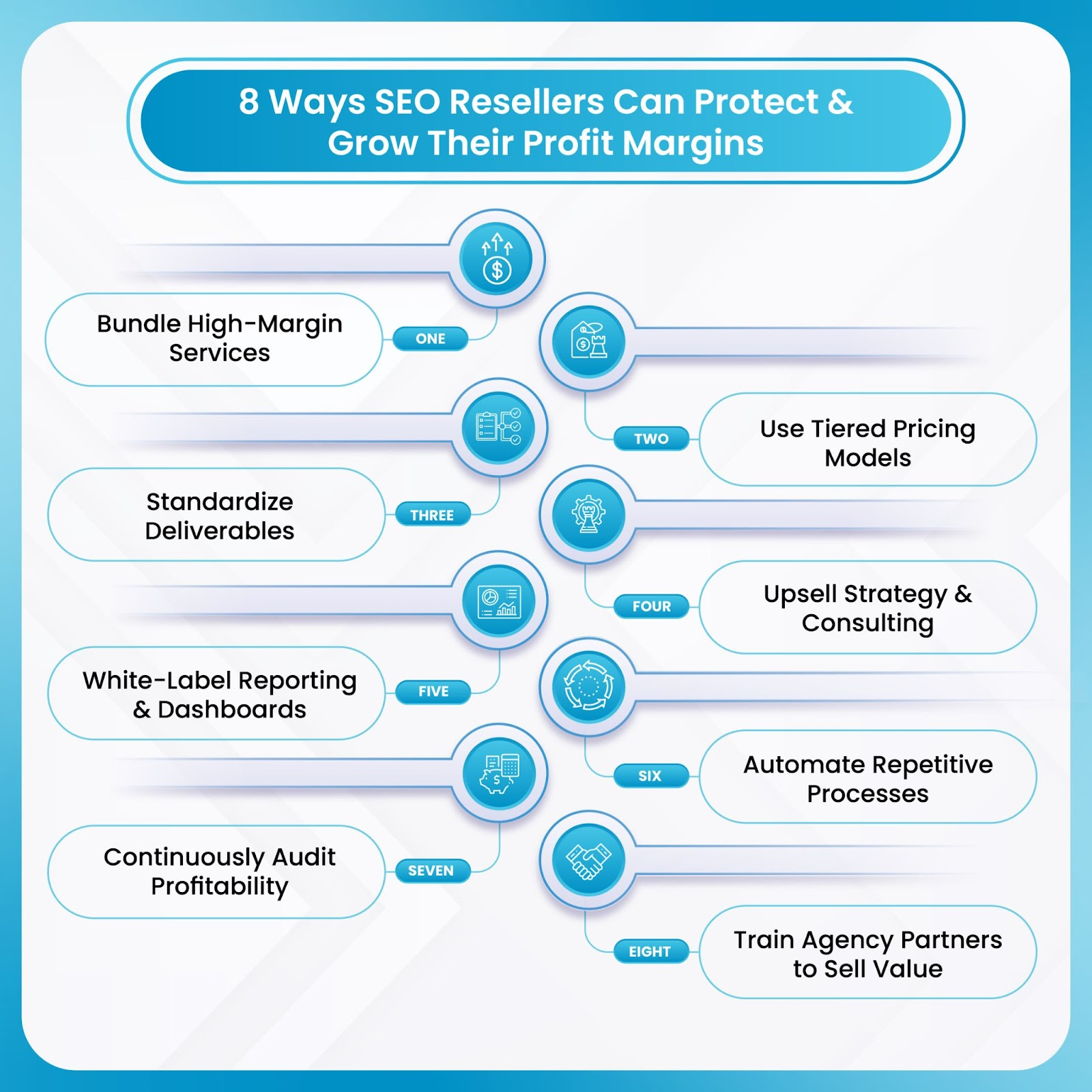
Competitive SEO Edge: Advantages Gained Overnight
White label SEO gives small agencies access to capabilities that would normally take months of hiring, training, and tooling to build internally. Instead of stretching limited resources, you can plug into a fully developed SEO operation and deliver high-level results right away.
Here’s what that looks like in practice:
1. Enterprise-Level Technical Diagnostics: You get access to deep crawl insights, site health audits, speed analysis, indexation checks, and error-resolution workflows that match what large agencies use. This lets you identify issues quickly and deliver fixes your clients can see.
2. Complete Content Ecosystems: From keyword research for SEO to content briefs, writing, optimization, and publishing support, you gain a full content engine without hiring writers or strategists. It becomes easier to publish consistently and target opportunities across the funnel.
3. Multi-Location Rollouts: Local SEO for businesses with dozens or hundreds of locations becomes manageable. You get bulk optimization processes, listing management, citation cleanup, and scalable location-page strategies.
4. Digital PR and Manual Outreach Capabilities: Instead of trying to build your own outreach team, you can tap into established relationships and proven processes for acquiring high-quality backlinks. This helps smaller agencies compete with larger players right away.
5. Schema Setups Across Large Sites: Structured data implementation can be time-consuming, especially for e-commerce or enterprise sites. White label SEO partners handle this with precision, improving visibility and eligibility for rich results.
6. Advanced Competitor Research: Robust competitor research tools and trained analysts give you insights into competitor gaps, content opportunities, backlink profiles, and emerging trends. You can offer clients strategic recommendations backed by real data.
7. Faster Turnaround Times: Because the fulfillment engine is already built, your projects move quickly. Clients see faster wins, and you spend less time managing production.
These advantages normally require multiple in-house employees to execute consistently. With white label SEO services, small agencies can offer all of this without expanding their team, which helps them stay competitive and increase margins.
White Label SEO as a Differentiator
- White label SEO lets smaller agencies compete at a higher level without needing a large in-house team.
- Clients get boutique-level attention supported by the technical expertise of a larger operation.
- It removes hiring risk because agencies don’t need to manage changing workloads or long training cycles.
- Agencies avoid the cost of bringing on specialized SEO roles.
- They can take on projects they might normally decline, including work in SaaS, legal, finance, and real estate.
- A white label SEO partner helps them shift from limited capacity to a scalable SEO operation.
- It creates room to pursue bigger clients and offer more services.
- Agencies can deliver strong, consistent results while keeping the personal touch that makes them unique.
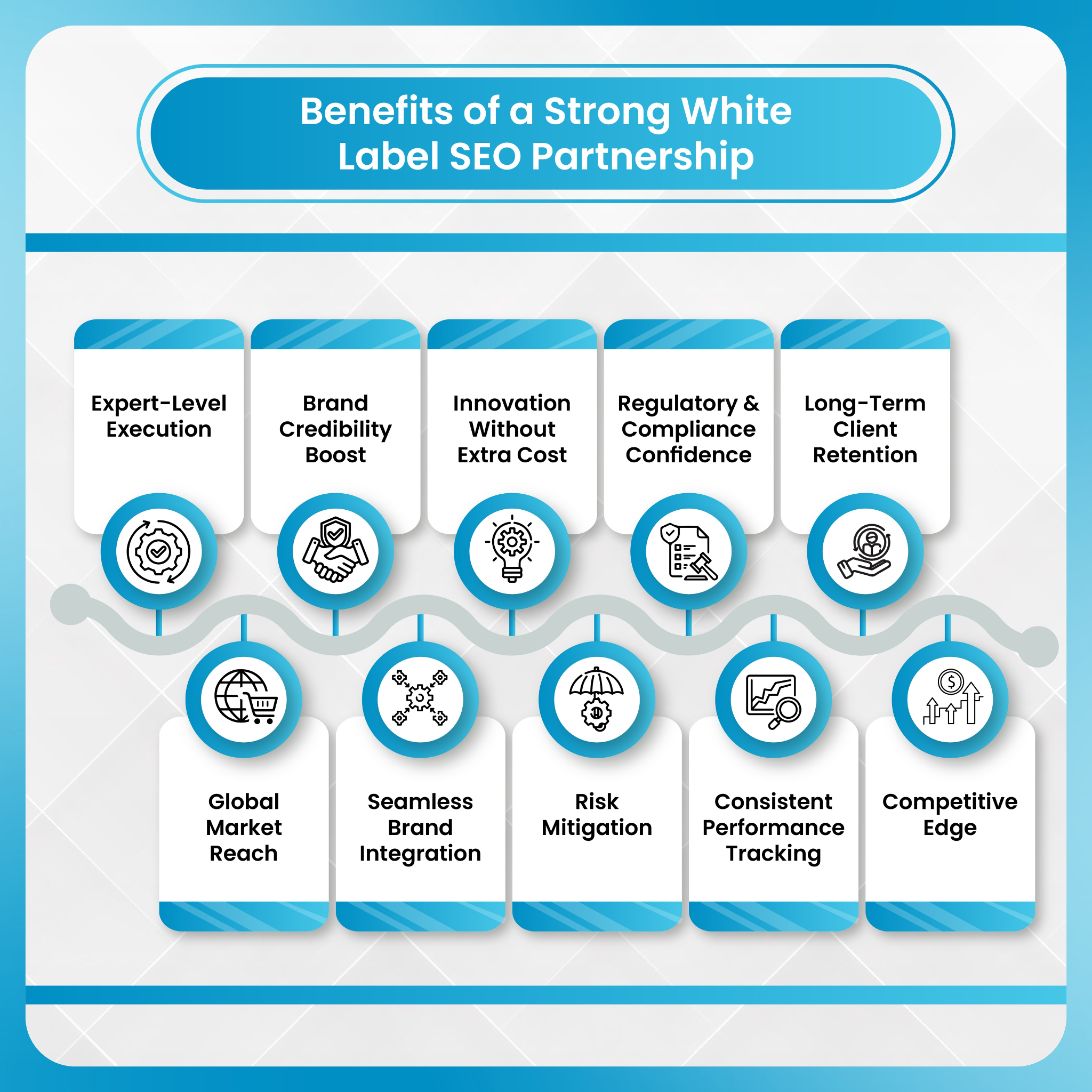
How DashClicks' White Label SEO Services Helps Small Agencies Compete?
DashClicks gives small agencies the kind of infrastructure that usually belongs to larger, well-resourced firms. Everything runs under the agency’s own brand, so clients see a smooth, professional experience without knowing there’s a fulfillment team behind the scenes.
Their white label SEO services cover the full workflow: audits, on-site optimization, content production, and link building. Agencies also get access to onboarding tools, client sub-accounts, and real-time reporting dashboards. Clients can log in, check rankings, review tasks, and see progress, all without any reference to DashClicks. Dedicated account managers handle each order, which helps keep campaigns consistent and reduces the chances of mistakes slipping through.
A key advantage is flexibility. DashClicks doesn’t lock agencies into contracts, minimum spends, or bulk commitments. You can start with a single SEO client and scale up as you grow. The process is structured but simple. It begins with an onboarding review, moves into campaign setup and technical fixes, and then shifts to ongoing optimization, content updates, and monthly performance improvements.
For agencies that want steady recurring revenue without expanding their internal team, DashClicks provides a system that’s easy to plug into. You stay in full control of client communication and strategy while their team handles the heavy lifting. This lets smaller agencies deliver enterprise-level SEO at scale while keeping their operations lean and efficient.
Conclusion
White label SEO allows small agencies to operate at a level that rivals much larger firms, without the need to hire a big team or invest heavily in tools and infrastructure. It gives agencies a clear competitive edge by improving the quality, speed, and consistency of their SEO services while keeping operational costs under control.
With access to professional fulfillment, agencies can confidently take on larger clients, retain accounts longer, and explore new verticals or service offerings that were previously out of reach. The flexibility and scalability of white label SEO let small teams focus on strategy, client relationships, and growth rather than execution alone.
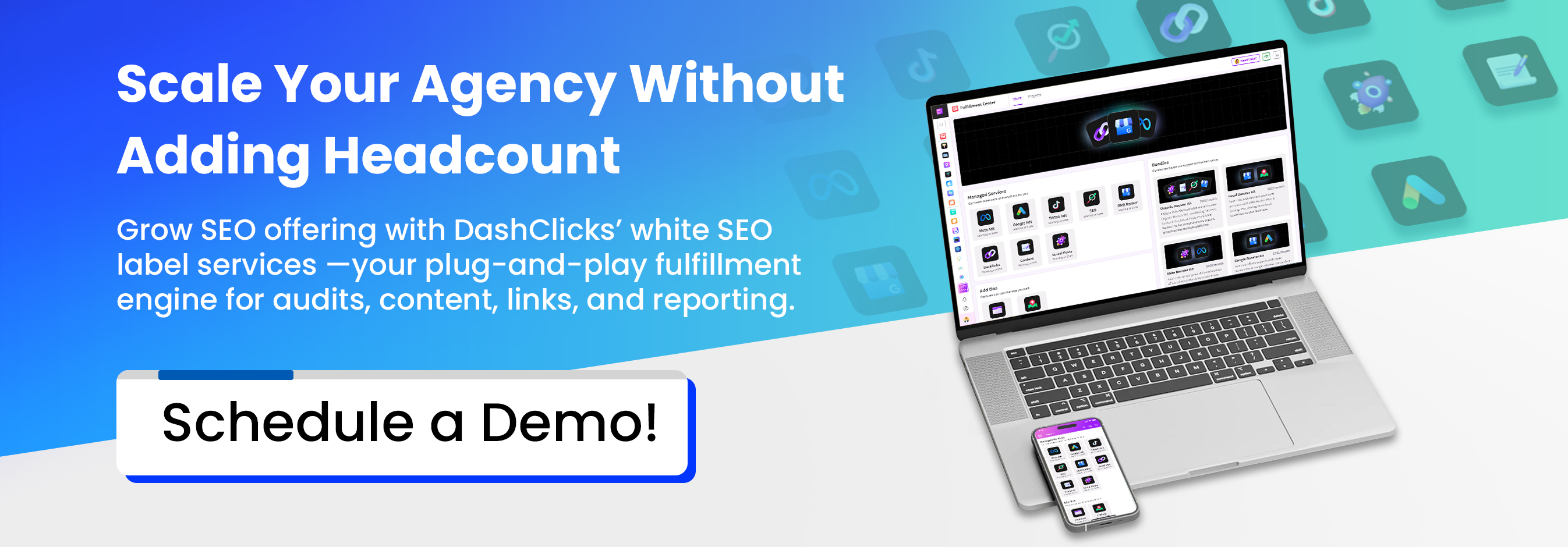

How Agencies Can Use Online Training Platforms to Scale Teams
Scaling a digital agency is rarely slowed by a lack of demand. It’s slowed by execution. As new clients come in, agencies hire fast—bringing on account agency leads, specialists, freelancers, and white-label partners across different time zones. The challenge isn’t finding talent. It’s ensuring everyone delivers work the same way, at the same standard, without founders becoming the bottleneck.
Online training platforms help digital agencies solve this problem. They make it possible to onboard teams quickly, standardize processes, and maintain consistent service quality as operations scale. Instead of relying on ad-hoc training calls or scattered documentation, agencies can use centralized training systems to equip every contributor with the same knowledge, tools, and expectations—no matter where they work from.
This shift is changing how digital agencies train, operate, and grow at scale.
1. Flexible Learning Opportunities
For agencies managing remote teams, freelancers, and white-label partners, flexibility ensures training never slows client delivery.
With an online employee training platform, team members have the flexibility to choose the lesson time and location. This flexibility makes it easier for people to fit training into their work schedules. If team members have the flexibility to plan their requirements, they are more likely to complete the courses.
2. Consistent Knowledge Delivery
E-learning platforms are made to offer the same information to all team members. This means modules can be updated in minutes, with every team member pulled into the newest guidance. Consistency creates a mental model across various teams.
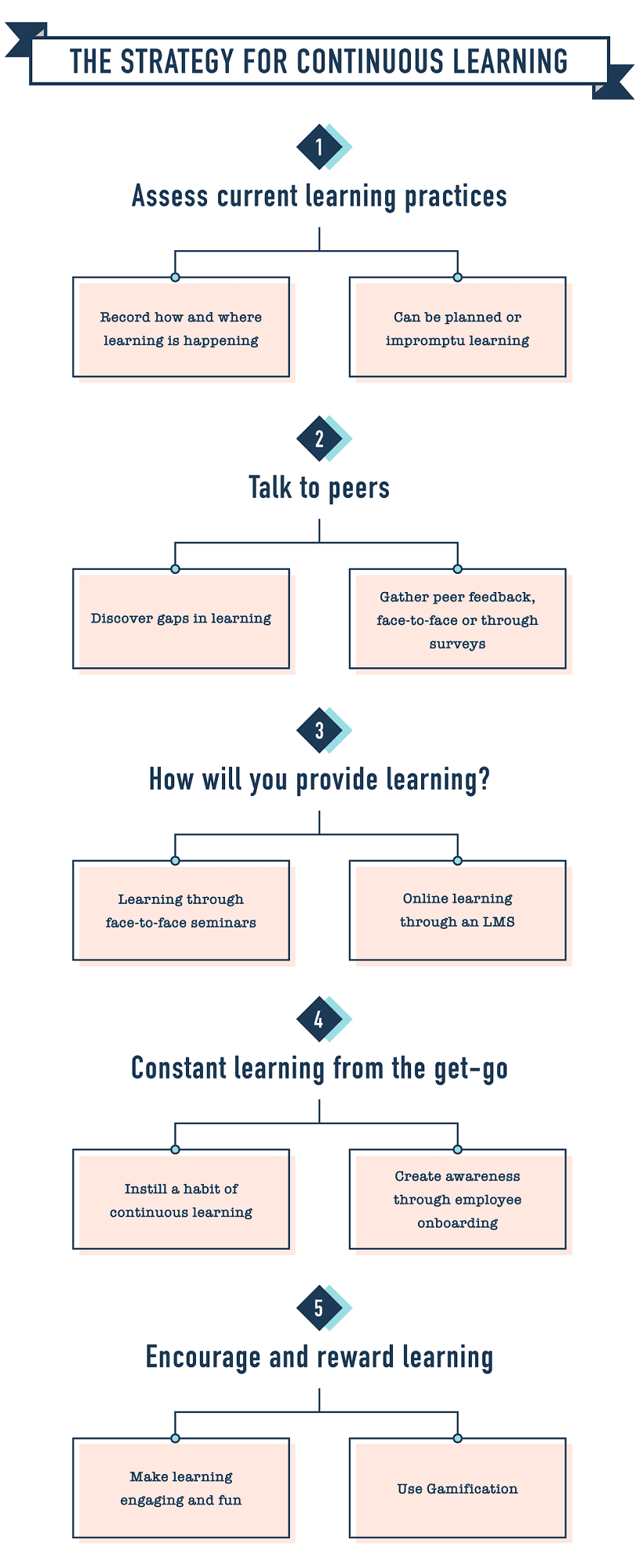
Image Source: LearnUpon
3. Personalized Learning Paths
Every team member learns differently. Online training systems offer personalized paths based on the results of quizzes and other adaptive content. These features assist team members in identifying areas that require improvement. This customized method keeps interest and eliminates irritation from repetitive content.
4. Tracking Progress and Measuring Success
With built-in analytics tools, agency leads can monitor participation and results. These insights reveal how effective your lessons are and where team members may have challenges. Data analysis is used to refine training strategies, coupled with progress tracking, to enhance accountability and celebrate achievements.
5. Cost-Effectiveness at Scale
Traditional training requires traveling, physically printed materials, and paying a fee for the instructor to teach. These costs are lower in the online world. By cutting out the logistical overhead involved in increasing access for more team members, large numbers of team members can access content with no additional logistical costs.
6. Supporting Collaboration and Community
Learning is not limited to solo environments. Discussion boards allow team members to seek advice and give it. Working together improves collaboration and enhances knowledge through common experiences.
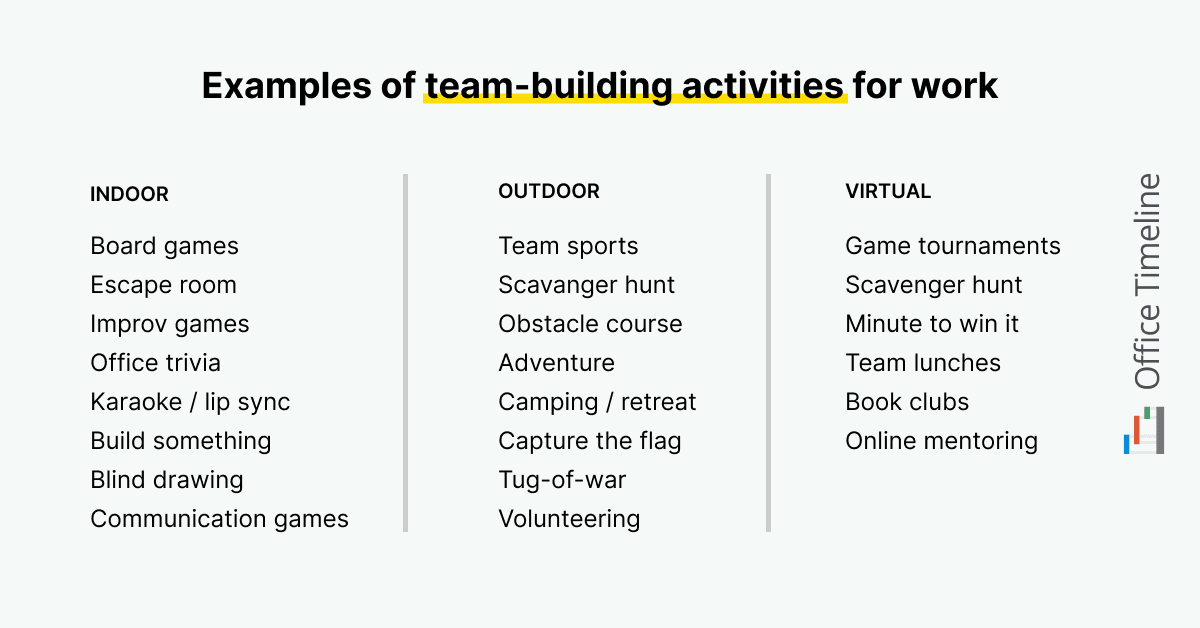
Image Source: OfficeTimeline
7. Adapting to Rapid Change
Regulations and best practices change often in many industries. New information is skillfully dispensed to team members without the waiting period for classes. Such agility helps agencies comply and compete.
8. Overcoming Geographical Barriers
One of the complications of global digital agencies is accessing team members working remotely in different regions. Web-based platforms decrease distance as an obstacle. People working in different places can get connected, building a collaborative method for learning. It enables everyone to take part fully with multilingual support enabled.
For agencies working with remote teams, freelancers, and white-label partners across regions, online training removes location as a barrier to consistent delivery.
9. Encouraging Self-Motivation and Responsibility
With online training, you place the responsibility in the hands of each individual learner. It fosters independence: team members set their own pace. When a team member conducts self-directed learning, they build confidence and feel accomplished, too. Providing this level of autonomy typically results in both retention and application of knowledge being better.
10. Enhancing Engagement With Multimedia
Content with too much text is hard to digest. Interactive content like videos, simulations, and quizzes encourages engagement. To clarify complex concepts, you need to have better visuals and activities.
11. Supporting Long-Term Development
Digital agencies need to develop the ability to adapt to continuously changing challenges. As roles change or new skills become required, online courses can be updated accordingly. Constant availability of resources cultivates a culture of growth.
As agencies grow, training stops being an internal function and becomes an operational requirement. New hires, freelancers, and fulfillment partners must be enabled quickly without compromising service quality or client expectations. Online training platforms give agencies a repeatable way to onboard teams, reinforce processes, and maintain consistency as delivery scales across accounts, regions, and services.
Further Reading: How To Build a Winning Team in Your Agency
Why Training Consistency Matters for Client Retention?
As agencies scale, client retention depends less on creative ideas and more on consistent execution. Clients expect the same level of quality, communication, and results regardless of who is working on their account. Training consistency plays a critical role in meeting those expectations.
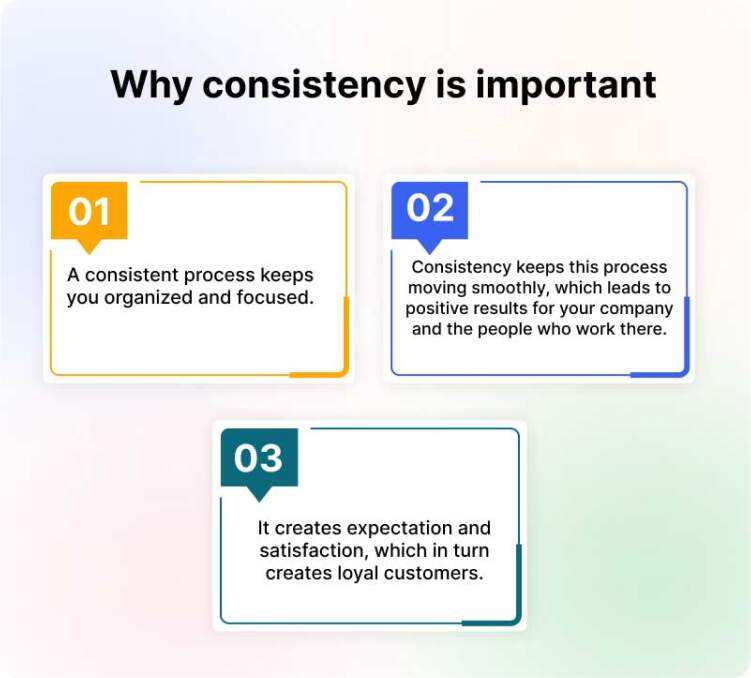
Image Source: REVE Chat
1. Predictable Delivery Builds Client Trust
Clients stay with agencies when execution feels reliable. Even strong strategies lose impact if delivery varies between team members, freelancers, or fulfillment partners. Consistency reassures clients that standards won’t change month to month and plays a key role in building long-term client trust.
2. Inconsistency Creates Uncertainty, Not Just Errors
When reports look different, timelines shift, or communication styles vary, clients begin to question reliability. These issues often appear small internally but signal instability externally, which weakens long-term confidence.
3. Standardized Training Aligns Service Execution
Consistent training ensures everyone follows the same workflows, tools, and quality benchmarks. This alignment reduces confusion, minimizes rework, and keeps delivery uniform across accounts and teams.
4. Onboarding Gaps Grow as Agencies Scale
As agencies hire quickly, training often becomes informal. New hires learn from different sources, freelancers rely on partial documentation, and partners interpret processes differently. Over time, these gaps compound and show up in client work.
5. Centralized Training Reduces Operational Friction
Online training platforms allow agencies to update processes in one place and push changes instantly. Teams stay aligned without repeated live sessions or manual follow-ups, which keeps execution stable even as services evolve.
6. Consistency Improves Efficiency and Accountability
When expectations are clear, teams make fewer mistakes and require less oversight. Agency leads spend less time fixing issues and more time focusing on the core principles of agency success, including scalable processes, accountability, and performance improvements.
7. Reliable Execution Strengthens Retention
Clients remain loyal when delivery feels professional and repeatable. Training consistency turns internal alignment into external trust, making retention a natural outcome rather than an ongoing challenge.
Addressing Security and Privacy Concerns
Digital agencies need to safeguard private data and sensitive client and internal data. But known training providers have secure platforms, and their privacy protocols are intact. Only frequent audits and system updates can keep trust intact. When data is responsibly managed, team members are more comfortable using online tools.
For agencies delivering services at scale, consistent execution matters as much as training. DashClicks supports this by helping agencies maintain operational consistency through white label fulfillment and scalable service delivery. When training systems and fulfillment processes work together, agencies can onboard teams faster, deliver predictable results for clients, and scale without operational friction.
Conclusion
Online training has transformed how teams learn at scale. The flexibility, consistency, and adaptability offered by these systems help agencies grow without losing control over service quality. By enabling faster onboarding, shared processes, and consistent execution across distributed teams, online training platforms allow agencies to overcome the operational challenges that come with scale while supporting personalized development.
As agencies expand their services and client base, structured training becomes a foundation for sustainable growth. Digital learning ensures teams stay aligned, capable, and prepared to deliver reliable outcomes—no matter how large or distributed the operation becomes.
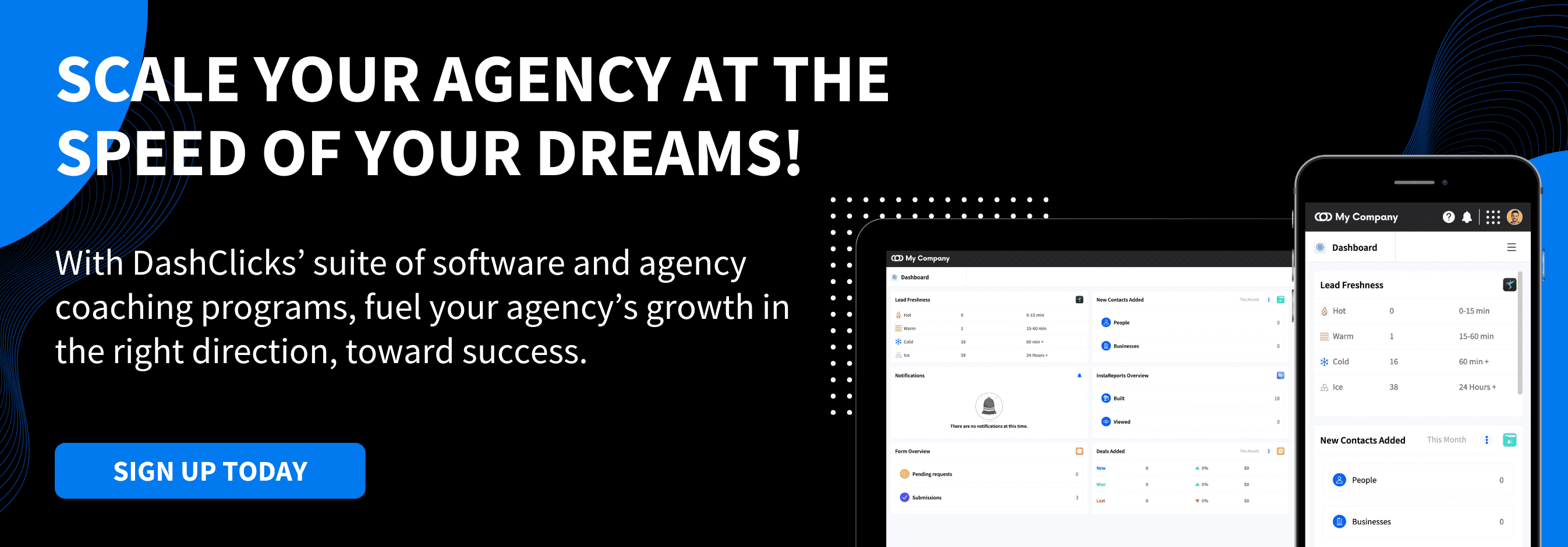

The Agency Playbook for White Label SEO Pricing: From Flat Rates to Value-Based Models
White label SEO services rely on agencies to successfully grow. It allows agencies, web firms, and even freelancers to offer a real SEO service to clients, and at the same time, without hiring an in-house SEO team.
However, one of the biggest challenges for agencies is figuring out a pricing structure for their white label SEO services that will still keep the agency profitable, competitive, and earn bonus points if they deliver any real value!
Understanding White Label SEO Pricing Models
Before we get into the money world, it is relevant to understand that pricing strategies for white labeling are not universally applicable.
Agencies adopt models that are consistent with their intended niche, service depth, and value offering. To manage these models efficiently, many service businesses use dynamic pricing infrastructure frameworks. This approach automates tiered and hybrid billing, helping agencies link revenue directly to deliverables, track margins transparently, and scale client accounts without manual recalculation.
Just as White label AI agents help automate client communication and reporting, these frameworks help agencies run leaner operations and focus on growth rather than micromanagement.
Here are the three most common pricing models.
1. Flat-Rate Pricing
A lot of agencies typically prefer a fixed monthly fee for certain deliverables. For example, the agency could offer a $ 300-per-month starter SEO package that includes deliverables such as on-page optimization, link building, and monthly reports.
Pros:
- Predictable revenue stream.
- Easy for clients to understand and budget.
- Simplifies project management.
Cons:
- Limited flexibility if client requirements vary.
- Profit margins can shrink if the white label provider increases rates or the client demands more work.
2. Tiered Packages
One of the most popular pricing structures for white label SEO is allowing agencies to create multiple packages, such as Basic/Standard/Premium packages, and Premium packages, each with a different level of service.
Example:
- Basic ($300–$500/month): Local SEO, basic keyword targeting, citation building.
- Standard ($700–$1,000/month): On-page + off-page optimization, monthly blog posts, technical audits.
- Premium ($1,500+/month): Complete SEO, content strategy, advanced analytics, and link outreach.
Why does it work: It provides agencies with the ability to service small businesses and larger organizations while fueling scalable profit margins.
3. Cost-Plus Pricing
With this model, agencies will take the base cost that they are charged from the white label provider, and then they will build in a markup for their profit, overhead, etc.
For example, if a provider offers a monthly SEO package for $400, the agency may charge the client $800 - $1,000 based on the support provided and the agency’s own branding.
Formula: Final Price = Provider Cost + (Markup Percentage × Provider Cost)
Advantages:
- Transparent and easy to calculate.
- Ensures consistent profit margins.
The critical factor here is value justification. The client must feel that the agency’s participation has added value to justify the markup.
4. Performance-Based Pricing
Some agencies price their services based on measurable results such as keyword rankings, website traffic, or conversions.
For example:
- $100 per keyword ranked in the top 10.
- $50 per 1,000 organic visits increase per month.
While this sounds appealing to clients, it’s riskier for agencies since SEO results depend on multiple variables. Agencies using this model often combine it with a base retainer to protect their revenue.
5. Custom or Project-Based Pricing
For SEO projects that only happen once, like audits, site migrations, or link cleanup, agencies tend to quote on a flat project basis. This can vary depending on the project scope, ranging from $500 to $5,000 (or sometimes more).

This works well for specialized agencies focused on offering high-value technical SEO solutions or consulting.
Key Factors That Influence White Label SEO Pricing
- Provider Costs: Each white label SEO provider is going to charge different prices based on the elements included, their expertise, and the quality of the work being provided. Agencies should have an idea of how much they are spending per client to avoid selling themselves short.
- Scope of Services: A campaign focused on local SEO for a small business will cost considerably less than a full-scale e-commerce SEO project that requires ongoing content and link building. Which businesses benefit from local seo practices? Local shops, restaurants, and service-based companies often gain the most. Local SEO helps them reach nearby customers actively searching for their products or services, driving real foot traffic and online conversions.
- Target Market: Budgetary expectations of your clients are one of the key considerations. An agency that works with startups or small, local businesses will need to have lower-priced options, while an enterprise account will expect to pay for premium-level service.
- Competition: If your competitor was offering SEO services for a lower rate than you, you'll need to make a case for your pricing with superior deliverables, full transparency, or a guarantee of performance.
- Overheads and Brand Value: Don't forget internal costs for client management, reporting, sales efforts, and communication. Investing in Team Communication tools like DashClicks’ Conversation Software can help streamline these internal processes, improving coordination and reducing inefficiencies.
Even if the white label provider is completing the work, the agency's work represents value that needs to be compensated.
How to Create “Perceived Value” That Justifies Higher Pricing?
Most agencies think pricing is about numbers, margins, and deliverables. In reality, pricing is 50% math and 50% psychology. Clients don’t pay more just because you do more work—they pay more when they feel they are getting a premium, reliable, and well-managed experience.
This is where perceived value allows agencies to charge 30%–150% higher markups on white label SEO packages without pushback. The goal is simple: make the client experience so smooth, organized, transparent, and professional that your price feels justified.
Here are the biggest drivers of perceived value:
1. Client Onboarding Experience
A polished client onboarding experience immediately signals that the client is in capable hands. When an agency provides structured intake forms, clear timelines, kickoff calls, and branded welcome materials, it creates a sense of professionalism from day one. Clients interpret this level of organization as a reflection of how their SEO campaign will be managed, making them far more comfortable paying a higher monthly fee.
2. Custom Reports With Branding
Visually appealing, branded reports elevate how clients interpret the quality of the work being done. Instead of generic spreadsheets or unformatted PDFs, a well-designed, agency-branded report communicates expertise and attention to detail. Clients often associate good design with better insights and better service, increasing their willingness to pay more for what feels like a premium deliverable.
3. Personalized Strategy Calls
Strategy calls add a human layer to the service that clients genuinely value. When an agency takes time to walk clients through progress, explain decisions, and offer guidance, it transforms the relationship from transactional to consultative. Clients feel supported, informed, and understood — and they naturally become more open to higher pricing because they’re not just paying for tasks, but for insight and expertise.
4. Quarterly Roadmaps
A quarterly roadmap helps clients visualize the long-term direction of their SEO campaign. It clearly outlines what has been completed, what’s planned next, and how each step contributes to their goals. This forward-looking transparency eases concerns about slow SEO timelines and reassures clients that their investment aligns with a strategic plan — making premium rates feel justified rather than questioned.
5. Dedicated Client Portals
Client portals add a level of transparency that removes uncertainty from the relationship. When clients can log in to view their reports, deliverables, tasks, updates, and communication history, they feel like they have complete visibility into the agency’s workflow. This access reduces doubts and reinforces the perception that the agency is structured, dependable, and worthy of higher fees.
6. Data Transparency
Clients who feel informed are far less likely to question pricing. By giving clear explanations of ranking changes, traffic fluctuations, completed tasks, and campaign decisions, agencies show accountability. This kind of transparency builds trust, and trust directly increases a client’s willingness to pay a premium since they never feel “in the dark” about the value being delivered.
7. White Glove Communication
High-touch communication is one of the strongest drivers of perceived value. When clients receive timely responses, proactive updates, simplified explanations, and consistent check-ins, they feel genuinely cared for. This level of attention makes the service feel luxurious rather than basic, giving agencies the freedom to maintain higher pricing without resistance.
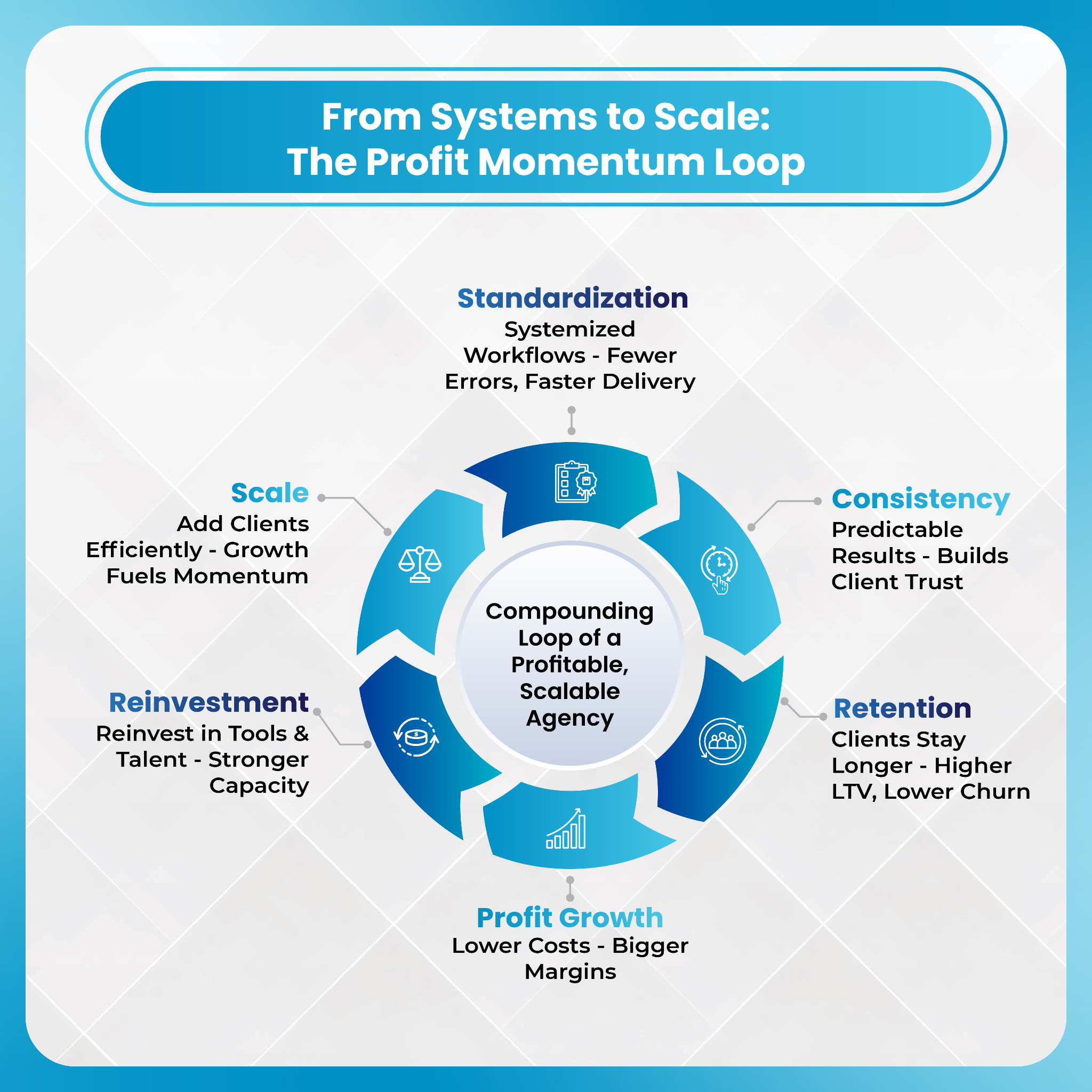
How Agencies Maintain Profitability?
1. Smart Markups
The white label SEO industry frequently defaults to a standard markup of 30%-70%. That said, when working with premium agencies that typically provide consulting, analytics, and branding support, markups can easily exceed 100%. Partnering with marketing staffing agencies can also help strengthen your operational capacity without inflating overhead costs, allowing teams to scale efficiently while maintaining profitability.
The real key is not competing on price, but on perceived value. The more personalized and transparent your service seems, the more easily you can defend eight-figure-type markups.
2. Streamlined Operations
Reporting, keyword tracking, project management, and client communication automation tools cut costs improving agency operations.
The more time your internal staff doesn't have to spend managing campaigns, the better your profit margins will be.
3. Transparent Reporting
Agencies that provide white label dashboard or branded reports build trust, which leads to less churn.
Clients who stay longer mean more long-term profitability, even if margins are smaller.
4. Choosing the Right Provider
Always choose providers that offer the following.
- Scalable SEO solutions
- Transparent deliverables
- Data-driven performance reporting
- Dedicated account support
5. Upselling and Cross-Selling
It is common for firms to offer SEO plus some other services like web design, PPC, or social media management since this strengthens their revenue stream and builds stronger client loyalty.
For example, combining “SEO + Content Marketing” can justify charging clients 20–30% more than SEO-only services.

Dangerous Pricing Mistakes Agencies Make (and How to Avoid Them)
Even with the right pricing model, many agencies unknowingly fall into traps that slowly destroy their margins. These mistakes are common, costly, and completely avoidable once you know what to look for. Understanding them helps agencies price confidently, protect profitability, and maintain long-term client relationships.
- Underpricing to “Win Clients”: Many agencies start with low prices to attract clients, but this approach rarely works long term. Underpricing signals low value, attracts high-maintenance clients, and leaves no room to cover provider costs or internal labor. Pricing based on value rather than fear leads to healthier, more sustainable growth.
- Ignoring Provider Price Changes: White label SEO provider occasionally increase their rates, and agencies who fail to adjust client pricing end up absorbing the difference. Over time, this quietly cuts into profitability. Reviewing costs quarterly and updating client pricing annually keeps your margins intact.
- Offering Too Many Deliverables in Low-Tier Plans: Trying to impress clients with “loaded” starter packages often backfires. Overstuffed low-tier plans drain resources, prevent upsells, and blur the line between basic and premium offers. Entry-level packages should stay lean, while advanced deliverables remain in higher tiers.
- Having No System for Scope Creep: Without clear boundaries, clients quickly push past the agreed scope with extra requests, revisions, or “quick fixes.” A defined scope, paired with upgrade paths or change fees, prevents small tasks from snowballing into margin killers.
- Not Defining Guaranteed vs. Non-Guaranteed Services: Agencies sometimes promise outcomes—like ranking timelines—that no SEO provider can guarantee. This leads to conflicts, discounts, or free extra work. Clarifying what is guaranteed (deliverables, reporting, communication) versus what is not (specific rankings or speed of results) protects both sides.
- Charging the Same Price Across All Industries: Different niches require different levels of work. A local bakery and a competitive legal firm should not pay the same rate. Industry difficulty, competition, and search volume should influence pricing to keep campaigns profitable and realistic.
Smarter Way for Agencies to Deliver SEO: DashClicks’ White Label SEO Services
DashClicks provides fully managed white label SEO services designed to help agencies scale without hiring internal SEO staff. Their fulfillment team handles core tasks like keyword research, on-page optimization, content creation, technical fixes, and link building, allowing agencies to deliver complete SEO campaigns under their own branding.
What makes DashClicks stand out is its unified dashboard. Agencies and their clients can track deliverables, rankings, reports, and campaign progress in real time, all displayed inside a clean white label portal. This eliminates manual reporting and strengthens transparency — a key factor in client retention.
For agencies managing multiple accounts, DashClicks offers predictable workflows, standardized deliverables, and consistent quality. It’s a plug-and-play SEO fulfillment model that supports both new and growing agencies, making it easier to scale operations, increase margins, and maintain a professional client experience.
Wrapping It Up
There’s nearly as much art as there is science in pricing white-label SEO services for profit. The most successful agencies don’t just put a simple markup on the provider cost. They create the perceived value through communication, branding, reporting, and customer care.
Regardless of whether you're providing tiered packages, project-based pricing, or value-based pricing, the outcome should be the same: consistently delivering results, being transparent, and scaling profitably.
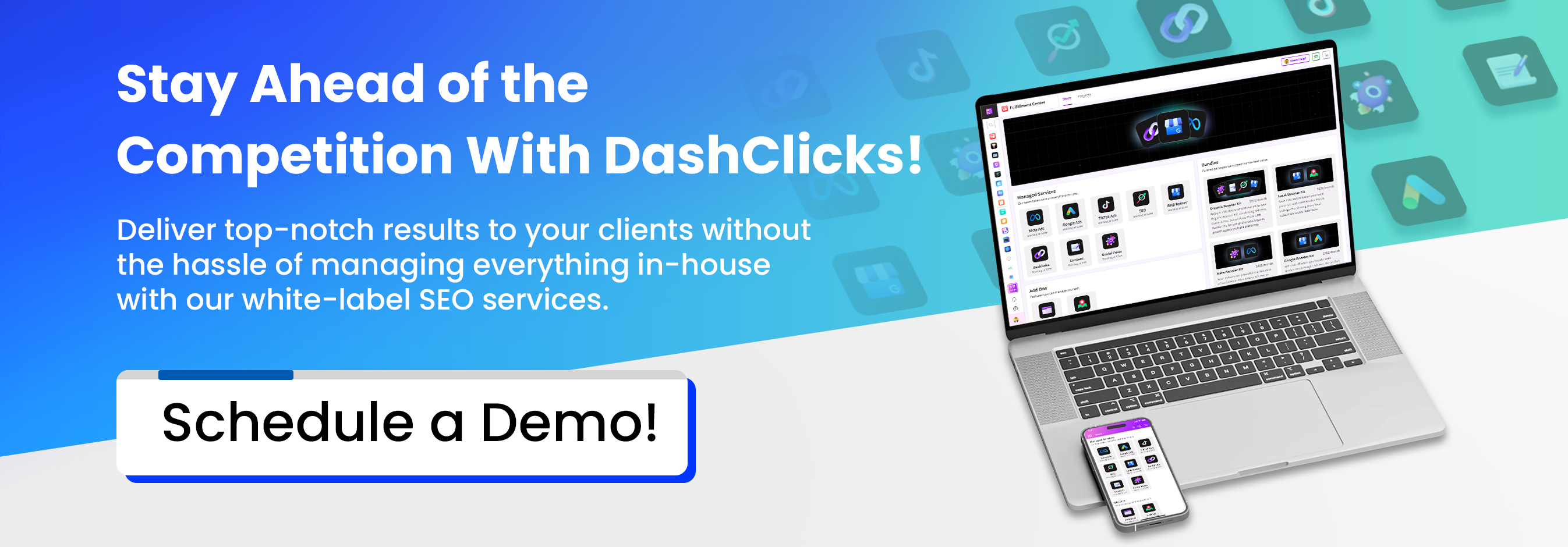

Maximizing Ad Budgets: How Agencies Use White Label PPC to Reduce CAC
Customer Acquisition Cost (CAC) is often the deciding factor in whether a business can grow or stall. When CAC climbs too high, profit margins shrink, and scaling becomes difficult. Agencies feel this pressure directly because their clients expect predictable results, lower acquisition costs, and efficient use of every ad dollar.
Yet PPC costs continue to rise across platforms. Competition is tighter, new advertisers enter the market every month, and algorithms evolve faster than most teams can keep up. That’s why many agencies are turning to white label PPC services to stretch budgets further and keep CAC under control.
Before we dive deeper, here is a quick definition:
White label PPC is when an agency sells paid advertising to clients under its own brand, but the actual campaign management, optimization, reporting, and execution are handled by a specialized third-party provider. Your agency owns the client relationship; the white-label partner handles fulfillment behind the scenes.
This model has gained huge momentum. According to market analyses and outsourcing studies, digital marketing outsourcing is growing at more than 18% annually, driven largely by PPC and paid media fulfillment demand. As platforms become more complex, agencies increasingly rely on external specialists to maintain performance.
The takeaway is simple: Agencies that use white label PPC strategically can reduce CAC, improve margins, scale faster, and offer consistent results without the overhead of building a full in-house PPC department.
Why Agencies Struggle to Maximize Ad Budgets?
Reducing CAC should be straightforward, but most agencies face systemic challenges that make optimization harder than it looks.
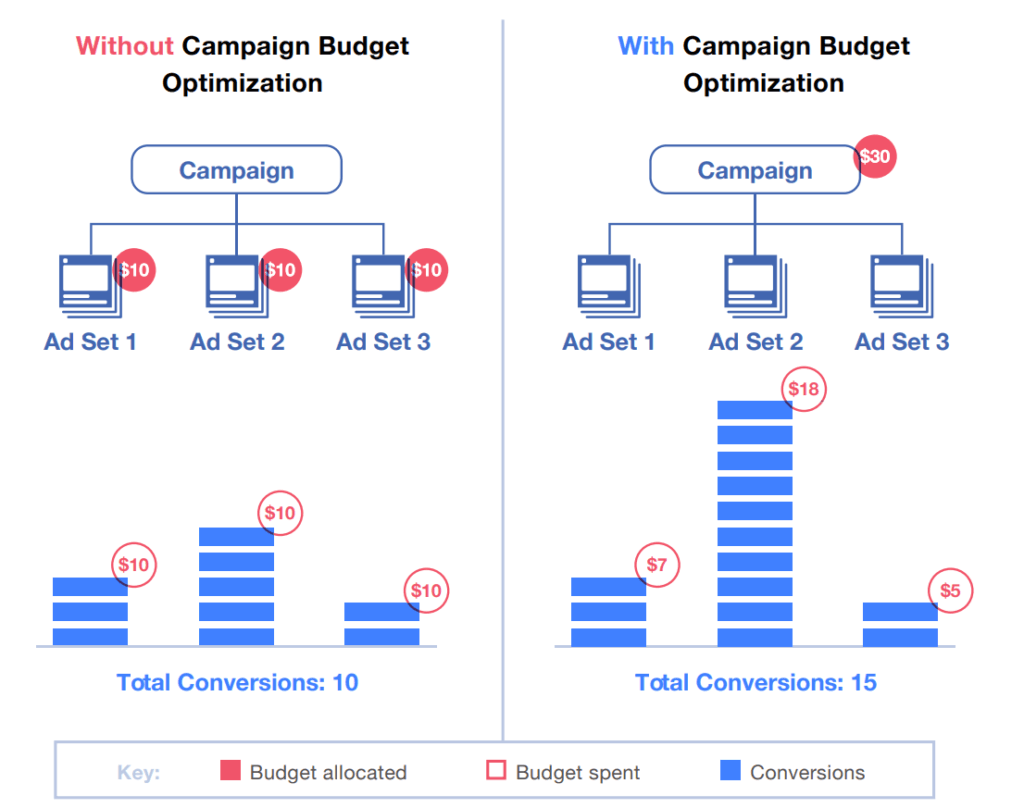
Image Source: Newsfeed
Below are the major roadblocks and their direct impact on CAC.
1. Rising Bid Costs and Competition
PPC platforms are more competitive than ever. Because more advertisers enter every year, the cost of reaching the same customer keeps rising.
Industry data shows:
- Average Google Ads CPC is around $2.69 across industries.
- LinkedIn Ads CPC frequently ranges from $5 to $7+.
- Facebook CPC has increased year-over-year, especially in B2B sectors.
These rising costs mean every inefficient click affects CAC. When CPC rises, but conversion systems stay the same, acquisition cost climbs naturally. Agencies that don’t have advanced optimization processes in place often see CAC slowly creep up.
In competitive niches like insurance, legal, SaaS, and financial services, CAC rises even faster. Without specialized management, even a good budget can evaporate with little return.
2. Internal Capability Gaps and Expensive Overhead
Running PPC well requires:
- Deep platform knowledge
- Hands-on experience with bidding algorithms
- Understanding of creative testing
- Conversion tracking expertise
- The ability to troubleshoot issues quickly
Finding someone with all these skills is difficult and expensive.
Senior PPC specialists command high salaries, and hiring inexperienced staff increases risk. Training takes time. Mistakes happen. Tracking setups break. Poor targeting leads to wasted spending. All of this increases CAC.
Add tool costs, onboarding time, salary overhead, benefits, and turnover, and you can see why many agencies struggle to maintain profitability.
3. Scale vs. Quality Trade-offs
As an agency grows, it handles more accounts. But PPC requires deep, account-level attention:
- Negative keyword audits
- Audience refinement
- Creative updates
- Bid strategy adjustments
- Campaign restructuring
- Landing page testing
When a team is stretched thin, these details get skipped.
Benchmarks highlight how essential ongoing optimization is. For example:
- Average CPA across industries is $59.18 (PPC industry benchmark)
- B2B CPA: $116+
- eCommerce CPA: $45+
A small gap in strategy or execution can push a client far above these numbers. That makes CAC unsustainable — and agencies risk losing accounts.
4. Reporting Problems and Slow Optimization Cycles
Agencies often rely on manual reporting. This slows everything down.
When reporting takes too long:
- Trends are spotted late
- Underperforming ads remain active longer
- Poor audiences run without being paused
- Platforms spend more before issues are flagged
Slow cycles mean high CAC stays high longer.
Modern PPC requires quick changes:
- Daily budget adjustments
- Rapid creative testing
- Frequent audience checks
- A/B test rollouts
- Weekly bid strategy refinements
Without real-time insight and fast reporting, CAC improvements stagnate.
5. Creative and Funnel Inefficiencies
Even great targeting can’t save poor creative or a weak landing page.
Common problems:
- Outdated ads
- Low CTR
- Poor message-to-page alignment
- Slow load times
- Confusing layouts
- Mobile friction
Every one of these issues reduces conversion rate (CVR), which directly drives CAC higher.
If a landing page converts at 3% instead of 5%, CAC increases by almost 40% — even if everything else stays the same. The funnel must work smoothly if you want lower acquisition costs.
Further Reading: How to Increase Agency Profits by Lowering Client Acquisition Costs
How White Label PPC Reduces CAC?
Here’s where the shift happens.
A strong white label PPC agency fills the exact gaps that increase CAC. Instead of struggling internally, agencies plug into a system of experts, processes, tools, and execution models designed for one purpose: lowering acquisition costs and improving ROI.
Let’s look at how this model works.
1. Access to Specialized PPC Expertise
White label PPC teams consist of specialists who manage campaigns all day, every day. They stay updated on:
- Platform changes
- Algorithm updates
- Best practices
- New ad formats
- Bidding options
- Performance diagnostics
They know what works in each industry because they’ve seen it across hundreds of accounts.
Industry research shows outsourcing PPC can improve efficiency by 25–35%. These gains typically come from:
- Better bidding strategies
- More accurate targeting
- Stronger negative keyword lists
- Faster optimization cycles
- Better-performing creatives
- Smarter landing page choices
That improvement translates directly into lower CPC, higher CVR, and ultimately lower CAC.
2. Scaled Data and Cross-Account Learning
One of the biggest advantages of white label PPC services is the massive pool of data they work with. A typical white label provider handles dozens or even hundreds of accounts.
This gives them data-driven awareness of:
- Which audiences convert?
- Which placements drain the budget?
- Which cross-device behaviors lead to conversions?
- What creatives fatigue fastest?
- What landing page structures drive higher CVR?
- What keywords underperform across industries?
This cross-account intelligence helps reduce CAC faster than isolated internal efforts.
Example: If the provider sees a certain audience consistently performing poorly across multiple ecommerce accounts, they can apply negative exclusions to your client's campaigns proactively — before budget gets wasted.
3. Automation, Technology, and Better Bid Strategies
Most agencies don’t have the budget or time to build custom PPC tools.
White label partners often use:
- Automated rules
- Scripting systems
- Portfolio bidding
- Smart bidding models
- Custom tracking scripts
- Dayparting automation
- First-party signal enhancements
These accelerate optimization cycles dramatically.
Instead of waiting days to identify an opportunity, the system may detect and adjust within hours. Faster reactions equal lower wasted spend, increasing efficiency and reducing CAC.
Fresh creatives are essential for controlling costs. When ads fatigue, CTR drops, CPC rises, and CAC spirals upward.
White label PPC providers have rapid creative workflows:
- Modular templates
- Quick UGC refresh cycles
- Organized creative libraries
- Structured multivariate testing
- Fast iteration loops
This keeps creatives performing at their peak and prevents CPC spikes.
Improved creative performance usually results in:
- Higher click-through rates
- Lower CPC
- Better landing page engagement
- Higher conversion rates
Together, these improvements push CAC down consistently.
5. Landing Page Optimization and CRO Alignment
A PPC campaign is only as strong as its landing page. Many white label PPC agencies include conversion optimization recommendations — sometimes even full landing page development. Small improvements here make a big impact.
Example math: If CAC is $60 at a 4% conversion rate, improving CVR to 4.8% (20% increase) drops CAC to roughly $50.
This nearly 17% CAC reduction can be achieved with:
- Better above-the-fold content
- Simplified forms
- Faster page load
- More relevant messaging
- Cleaner design
These improvements compound, not stack. That’s why CRO paired with PPC is so powerful.
6. Pricing Efficiency That Protects Agency Margins
Running PPC in-house carries:
- High fixed payroll
- Tool subscriptions
- Training costs
- Employee churn risk
- Longer ramp-up times
White label PPC services shift these costs to a variable model. You pay only for what you use. There are no long-term commitments, no hiring risks, and no training overhead. This protects your margins and stabilizes cash flow.
White label PPC pricing models often include:
- Per-account pricing
- Percentage-of-spend pricing
- Flexible tiers
- Scalable packages
DashClicks, for instance, offers white label PPC fulfillment solutions that give agencies predictable fulfillment costs while improving overall client ROI.
7. Faster Scale with Predictable Processes and SLAs
White label PPC providers rely on standardized:
- Onboarding systems
- Optimization cycles
- Reporting dashboards
- Performance reviews
- Creative workflows
This structure speeds up results and reduces CAC faster because nothing gets delayed.
Predictability is key for agencies that want to scale without losing quality.
8. Real-World Benchmarks and Market Trends Supporting Outsourcing
A few verified benchmark statistics:
- Average PPC search CPA: $59.18
- B2B CPA: $116+
- eCommerce CPA: $45+
- Digital marketing outsourcing growth: 18%+ annually
- Outsourced PPC typically improves efficiency by 25–35%
These trends show why agencies adopting white label PPC early gain a competitive advantage.
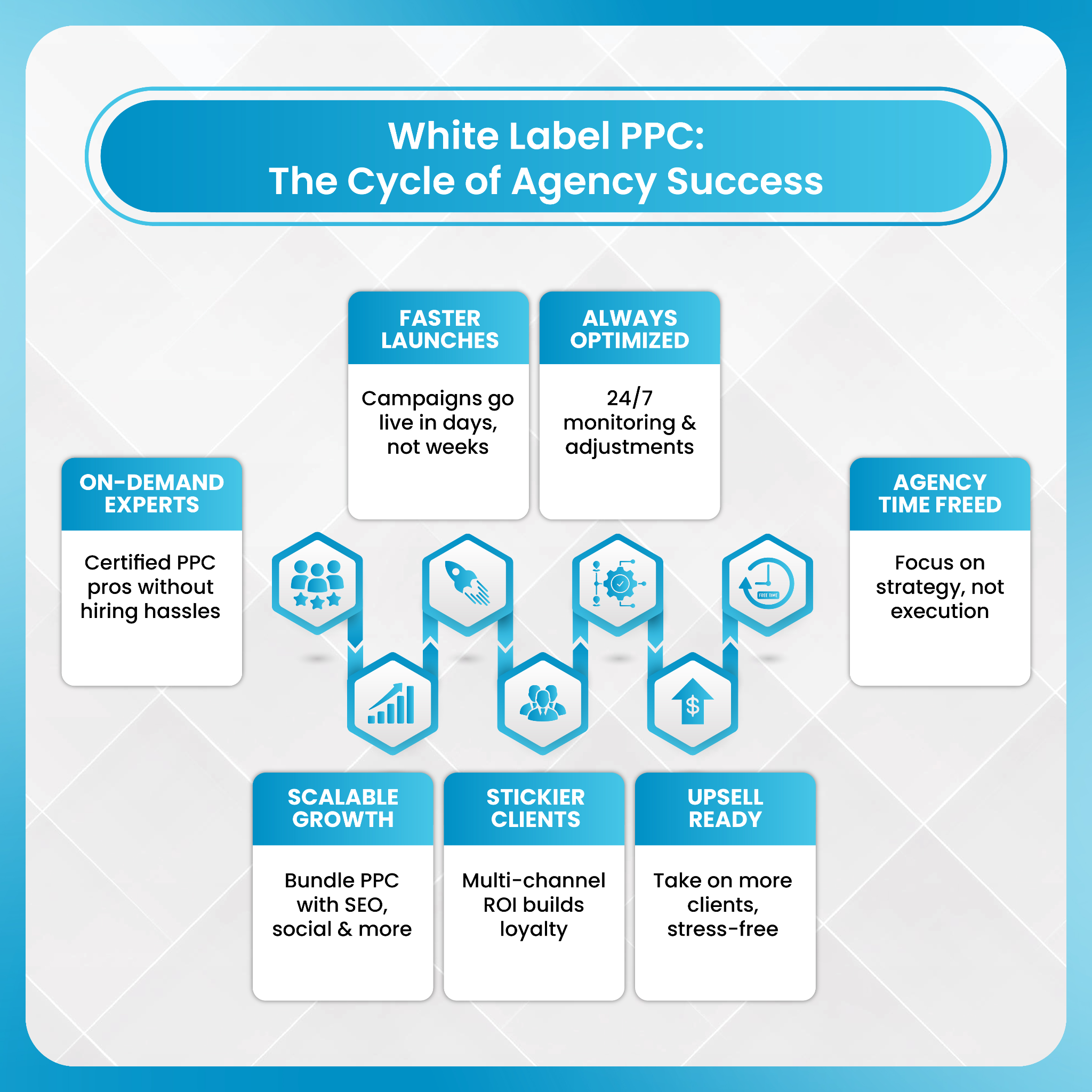
How Agencies Can Use White Label PPC to Reduce CAC — A Tactical Playbook
Here is a clear, practical process for implementing white label PPC successfully.
1. Choose the Right Partner (Scorecard Method)
Evaluate partners on:
- Industry experience
- Case studies
- Certifications
- Reporting transparency
- Optimize turnaround time
- Creative testing capabilities
- Funnel experience
- Tracking and analytics skills
Red flags:
- No proof of results
- Slow communication
- No dashboard access
- Lack of transparency
2. 30/60/90-Day Onboarding Roadmap
First 30 days:
- Full account audit
- Tracking fixes
- Baseline metrics established
- Creative planning
- Keyword and audience research
Days 30–60:
- Launch test campaigns
- Begin CRO updates
- A/B test core creatives
- Add negative keywords regularly
- Build client-facing reporting dashboards
Days 60–90:
- Scale winning campaigns
- Introduce automation tools
- Refine audiences
- Expand channels (Meta, TikTok, YouTube, etc.)
3. What to Track Weekly vs. Monthly
Weekly:
- Spend
- CTR
- CPC
- Creative fatigue
- Audience performance
- Bid strategy changes
Monthly:
- CAC
- LTV: CAC ratio
- Conversion rate
- Channel comparisons
- Funnel performance
These metrics reflect how well CAC is being managed.
4. Experimentation Roadmap
A structured testing order helps avoid waste:
- Creative variants
- Audiences
- Landing pages
- Bid strategies
- Offer testing
- Channel expansion
This sequence keeps CAC trending down while capturing clean data.
5. Packaging and Pricing for Agencies
When reselling white label PPC:
- Present it as your in-house fulfillment
- Price based on your cost + target margin
- Offer fixed monthly retainer + percentage ad spend
- Package it as a performance-focused solution
6. Contract Clauses to Protect Margins
Include:
- Minimum spend
- SLA on reporting
- Clear data ownership
- 30-day cancellation terms
- Escalation procedures
These safeguard your agency and your clients.
Mini Case Study (Illustrative)
A retail brand struggled with rising CAC at $120 per customer. Their agency engaged a white label PPC team.
Within 90 days:
- Creative testing improved CTR by 28%
- Dayparting automation reduced CPC by 19%
- Landing page updates increased CVR by 22%
Result: CAC dropped to $86, a 28% reduction.
This aligns with industry data showing outsourced PPC often improves performance by 25–35%.
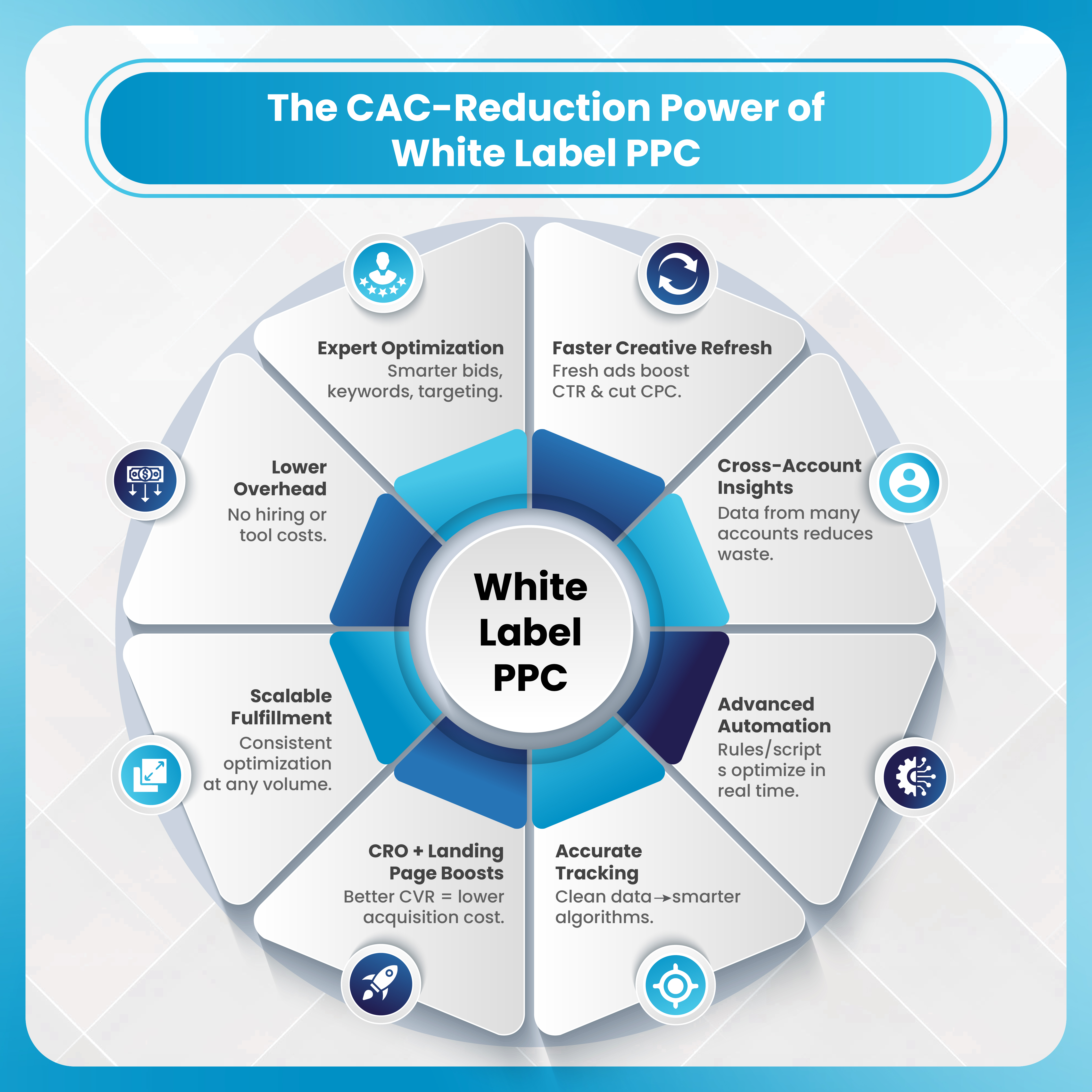
Handling Common Objections
1. “Will we lose control?”
No. You retain the client relationship. A strong provider offers branded reporting and full visibility.
2. “Isn’t hiring cheaper?”
Not when you include salaries, benefits, training, tools, and turnover risk.
3. “What about quality?”
Due diligence prevents this. Look for certifications, case studies, and transparent communication.
How DashClicks Helps Agencies Reduce CAC with White Label PPC?
DashClicks provides a complete white label PPC services that helps agencies improve CAC and scale smoothly. Their platform offers:
- Expert-managed PPC campaigns across major ad platforms.
- Branded dashboards agencies can share directly with clients.
- Tracking, reporting, and analytics are built into the system.
- Scalable pricing designed for agencies of all sizes.
- Fast onboarding and consistent optimization cycles.
- Transparent workflows that keep agencies in full control.
Because the system is built specifically for agency fulfillment, it eliminates overhead, accelerates performance, and keeps CAC trending downward across campaigns.
Conclusion
In today’s competitive advertising landscape, agencies need a smarter way to manage ad budgets. White label PPC provides an efficient pathway to reduce CAC, scale faster, and increase profit margins without expanding internal teams.
By tapping into specialized expertise, advanced tools, structured processes, and real-time optimization, agencies can deliver better results for clients while protecting their bottom line.
To get started:
- Audit your current PPC accounts.
- Select a reliable white label PPC partner.
- Test the model with one account and measure CAC improvements.
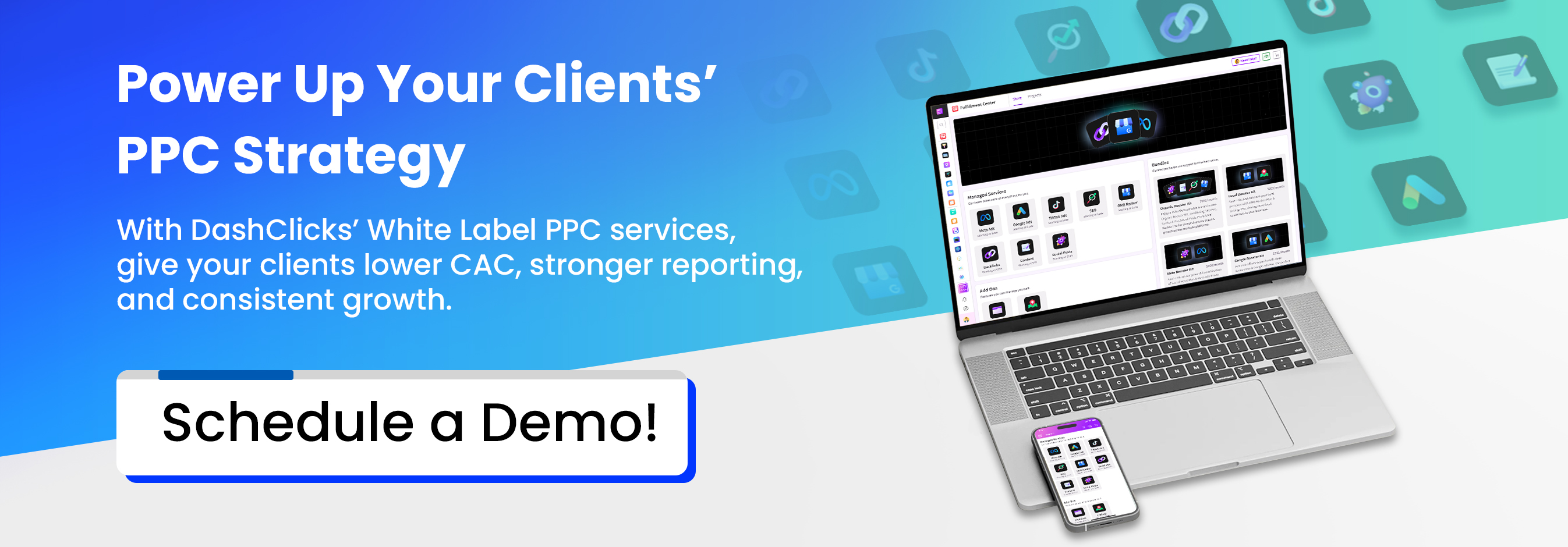

White Label SEO for Reputation Management and Brand Authority Building
In today’s digital-first world, search results, online reviews, and owned content have become the main drivers of business conversions. Consumers no longer make decisions based solely on clicks or advertisements—they carefully evaluate what they read and see about a brand across multiple platforms. Trust has shifted from traditional marketing to peer recommendations and authoritative content.
A survey conducted by Reputation&Trust Analytics found that 92% of consumers trust online reviews as much as personal recommendations, highlighting the critical role of reputation in influencing purchasing behavior.
At the same time, the reputation management market is projected to grow at a compound annual growth rate of 10.8% through 2030, emphasizing the vast potential for businesses to leverage online perception to drive revenue and customer loyalty.
Establishing a strong reputation and authority is now a core business strategy. White label SEO empowers agencies to offer professional reputation management and authority-building services at scale without hiring in-house experts.
By partnering with specialized vendors, agencies can continuously monitor, optimize, and safeguard a brand’s online presence while focusing on strategic growth and client relationships. This approach ensures brands remain visible, trustworthy, and authoritative across search results, reviews, and content platforms, directly impacting leads, conversions, and long-term business success.
Why Most Agencies Struggle to Deliver Reputation & Authority?
Building and maintaining a strong online reputation is complex and requires expertise across multiple areas. Agencies face several challenges that make it difficult to consistently deliver results:
- Fragmented Signals: Reviews, knowledge panels, featured snippets, press mentions, social media, and backlinks all influence perceived authority. Coordinating these channels to present a cohesive brand presence is challenging.
- Skill and Resource Gaps: SEO reputation management demands continuous monitoring, rapid crisis response, high-quality content creation, legal and technical takedown knowledge, and timely reporting. Many agencies do not have in-house teams with the necessary expertise across all these areas.
- Speed and Scale Challenges: Brands require ongoing review collection, prompt responses, and fresh authoritative content. Agencies often lack the resources to scale these tasks effectively in-house.
- Measurement Difficulties: Tracking multi-channel signals and maintaining consistent KPIs is critical to demonstrate ROI. Agencies that fail to do so risk client dissatisfaction and revenue loss.

Common Pain Points Include:
- Negative content appears on the first-page search results.
- Inconsistent review generation and responses.
- Slow crisis mitigation.
- Limited control over knowledge panels and overall brand representation.
These obstacles highlight why reputation and authority management can be difficult for agencies without specialized tools and white label SEO services.
How White Label SEO Agency Solves It?
White label SEO allows agencies to offer comprehensive reputation management and brand authority services by leveraging the expertise of specialized external teams. This approach enables agencies to scale operations, maintain high-quality service, and deliver measurable results without building in-house teams.
1. Centralized Monitoring & Early Warning
Agencies gain the ability to continuously monitor reviews, SERP mentions, social signals, knowledge panels, and backlinks. Early detection of potential issues prevents negative content from gaining traction.
White label SEO agency provides rebrandable dashboards, automated alerts, and triage playbooks that agencies can use to manage client accounts efficiently. Key performance indicators include time-to-detect and time-to-first-response, ensuring rapid mitigation of reputation risks.
2. Review Acquisition & Response Systems
Consistent review acquisition is critical to establishing credibility. White label SEO partners manage systematic review generation through SMS or email prompts, post-interaction flows, and other strategic methods. Pre-approved, templated, and personalized responses streamline the process, ensuring high engagement.
Agencies can leverage these services to test different call-to-action, optimize review flows, and maintain continuous improvement. KPIs to track success include review velocity, average ratings, response rate, and the conversion lift linked to improved review performance.
3. SERP Sculpting & Negative-Content Suppression
Targeted content and strategic link-building are essential for shaping a brand’s search presence. By promoting positive assets—such as blogs, press releases, local citations, and authoritative guest posts—agencies can suppress or push down negative results. The goal is to dominate the first page with content that reflects the brand’s strengths and credibility.
White label SEO providers execute these strategies efficiently, producing and optimizing high-quality authority content while agencies retain full control of the client relationship. Key KPIs include first-page coverage of positive content, the number of suppressed negative results, and improved brand sentiment visibility.
4. E-E-A-T & Authority Content
Experience, Expertise, Authoritativeness, and Trustworthiness (E-E-A-T) are crucial factors in building both search and user credibility. Brands that demonstrate expertise through credible bylines, verified citations, case studies, and structured data earn greater visibility and trust.
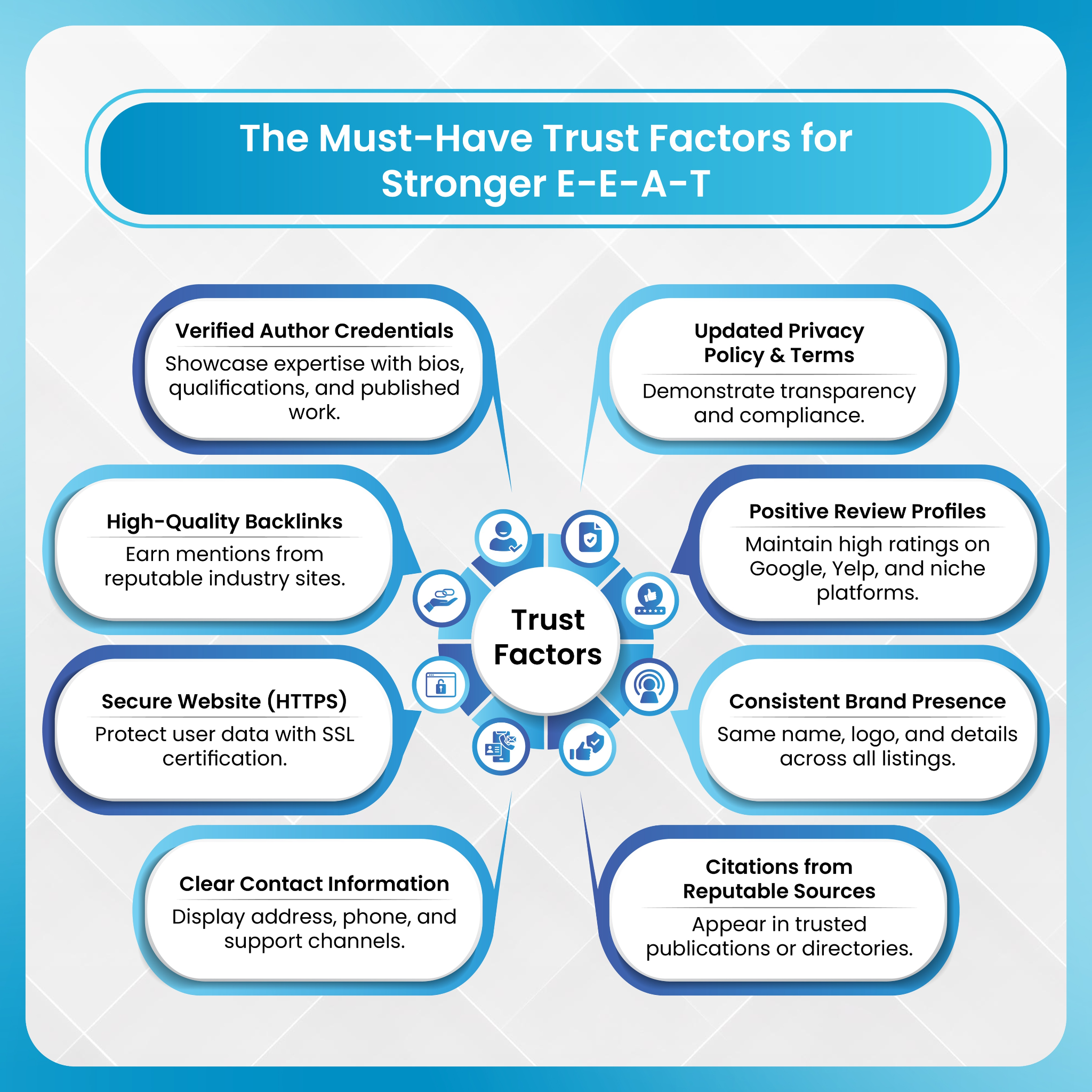
White label SEO teams specialize in creating this type of content, managing editorial reviews, schema implementation, and PR outreach to enhance authority signals. Agencies benefit from improved knowledge panel accuracy, higher chances of earning featured snippets, and stronger rankings for brand and authority-focused queries.
Further Reading: Measuring Client Impact: Using White Label SEO to Improve E-E‑A‑T Scores
5. Local SEO & Google Business Profile (GBP) Mastery
Local visibility plays a major role in shaping reputation, especially for service-based and location-driven businesses. Optimizing Google Business Profile, maintaining consistent citations, producing localized content, and managing Q&A sections are all key to establishing trust with nearby audiences.
White label SEO platforms handle these tasks at scale, offering citation audits, GBP optimization, and review syndication. KPIs to monitor include GBP visibility, local pack rankings, call volume, direction requests, and overall engagement with the business listing.
6. Crisis Playbooks & Rapid Response
Reputation crises can escalate quickly if not addressed with precision and speed. Having a structured response plan is vital to minimizing damage. White label SEO providers equip agencies with pre-tested legal, PR, and SEO playbooks that streamline crisis management. These include templates for outreach, emergency suppression campaigns, and correction requests to media or web platforms.
When negative content surfaces, rapid-turn content publishing and targeted link-building are deployed to push it out of prominent search positions. KPIs such as the percentage of negative content removed or demoted from the top 10 results within a defined timeframe help measure success. By leveraging white label SEO services, agencies can act fast, maintain brand credibility, and demonstrate measurable recovery.
7. White Label Reporting & Client Communications
Proving the value of reputation and authority-building efforts is essential for client retention. White label reporting tools like DashClicks’ Analytics Software make it easy for agencies to deliver professional, branded dashboards and monthly summaries that highlight performance outcomes. Automated narratives and KPI tracking simplify complex data, helping clients understand tangible ROI.
These reports typically include metrics such as review growth, keyword rankings, traffic improvements, and sentiment shifts. By outsourcing the reporting process, agencies can save time, enhance transparency, and strengthen client trust while focusing on strategy and expansion.
How DashClicks Helps Agencies with White Label SEO?
DashClicks empowers marketing agencies to offer professional-grade reputation management and brand authority services under their own brand. Its comprehensive white label SEO services combine centralized monitoring, review management, content creation, link-building campaigns, and automated reporting—all in one place.
Agencies can track reviews, manage client feedback, optimize search visibility, and execute authority-driven SEO strategies without needing in-house teams. DashClicks’ streamlined workflows and real-time analytics enable agencies to scale efficiently while delivering measurable outcomes like improved search rankings, accurate knowledge panels, and a stronger digital reputation.
With DashClicks, agencies can confidently manage client reputations, maintain first-page dominance, and build lasting brand authority.
Unique Frameworks & Tactics Agencies Can Copy
Delivering measurable reputation and authority outcomes requires structure. The most successful agencies use proven frameworks that align daily actions with long-term growth goals. Below are some practical strategies you can adapt immediately.
1. Authority Signals Matrix
Reputation and authority are shaped by multiple signals—reviews, backlinks, press mentions, knowledge panels, and social media visibility. The Authority Signals Matrix helps agencies map these elements by urgency and impact. Quick wins, such as review responses or Google Business Profile (GBP) optimization, can drive noticeable results in weeks.
Meanwhile, long-term initiatives like PR collaborations, authority content, and link-building strengthen brand trust over time. This balanced approach ensures that every client’s digital reputation improves steadily and sustainably.
2. Search-First PR
Traditional PR focuses on exposure, but Search-First PR goes a step further by integrating SEO goals into earned media strategies. When PR campaigns are aligned with optimized landing pages and targeted keywords, each media mention contributes to stronger search rankings and authority signals. Agencies using this model turn press coverage into an ongoing SEO asset rather than a one-time publicity spike.
3. Review Velocity Optimization
Instead of random review requests, agencies can use data to time them strategically. Scheduling review prompts after high Net Promoter Score (NPS) touchpoints—like successful service completions or positive customer interactions—drives authentic, high-quality reviews.
A white label tools provider like DashClicks can automate this process while throttling request frequency to avoid platform penalties. Maintaining a consistent review flow helps build trust and sustain long-term visibility in local searches.
4. Entity-First Content
Entity-First Content involves building topic clusters around a brand’s identity, expertise, and related themes. This approach strengthens how search engines understand and associate the brand with specific topics. Using structured data and entity co-occurrence (mentions of the brand alongside relevant keywords), agencies can dominate both branded and related queries. It’s a long-term strategy that cements a client’s authority across their niche.

Example in Practice: For instance, a local healthcare clinic implemented a structured review prompt system and GBP optimization. Within three months, its positive review velocity increased by 30%, resulting in a 20% lift in appointment bookings. These results show how small, consistent actions—when guided by the right framework—can lead to substantial growth in both reputation and revenue.
Creating clear packages and service-level agreements (SLAs) helps agencies streamline operations and set accurate client expectations. A structured offering also makes it easier to scale while maintaining profitability.
- Lite Package: Designed for small businesses or startups, this plan focuses on reputation monitoring and monthly reporting. It’s ideal for clients who want visibility into their online mentions but don’t yet require full-scale intervention. The package includes sentiment tracking, basic SEO audits, and regular updates on review trends.
- Growth Package: A balanced option for growing brands, the Growth plan includes monitoring, review management, and local SEO optimization. Agencies can use tools to improve review generation, respond to feedback efficiently, and ensure consistent citation management across local listings. This plan offers steady authority growth while keeping costs manageable.
- Authority Package: The premium tier delivers a complete reputation and authority-building suite—monitoring, content creation, PR outreach, link-building, and crisis response. It’s best suited for established brands that require active protection and continuous authority expansion. This tier often includes custom reporting dashboards and crisis SLAs for rapid response.
Service-Level Agreements (SLAs): Establish clear timeframes to maintain accountability and trust. For example:
- Monitoring Windows: 24/7 for higher-tier clients, business hours for Lite plans.
- Response Times: Initial triage within 4–24 hours, depending on package.
- Reporting Frequency: Monthly or bi-weekly updates with executive summaries.
Pricing Models: Agencies can choose from:
- Fixed retainers for predictable billing and easier scaling.
- Performance-based bonuses are tied to metrics like review improvements or search visibility gains.
- Hybrid models that combine a setup fee with a recurring monthly charge.
To ensure profitability, aim for a 40–60% gross margin depending on fulfillment complexity and client size. This provides enough flexibility to reinvest in tools, content, and white label support.
KPIs & Measurement Framework
Tracking the right key performance indicators (KPIs) ensures transparency and demonstrates measurable progress to clients. Agencies should monitor these metrics monthly:
- Net Brand SERP Share: The percentage of first-page results controlled by the brand or positive mentions.
- Review Metrics: Velocity, average rating, and response rate to gauge trust and engagement.
- GBP Signals: Profile views, calls, direction requests, and search impressions.
- Authority Outcomes: Featured snippets, knowledge panel presence, and branded organic traffic growth.
- Crisis Metrics: Percentage of negative content suppressed or removed from page one.
For better attribution, use A/B testing or lift tests to connect online reputation management (ORM) efforts to measurable business outcomes such as higher conversions, customer lifetime value, and retention rates.
By combining transparent pricing, performance-driven SLAs, and consistent reporting, agencies can position their reputation management services as both results-oriented and scalable.
Onboarding Checklist + 30/90/180 Day Plan
A structured onboarding and execution plan helps agencies deliver consistent results, streamline collaboration, and build client confidence from day one.
Fast Onboarding (Initial Setup)
To set a strong foundation, gather all necessary assets and information before campaigns begin.
- Credentials: Access to Google Business Profiles, analytics tools, and social media accounts.
- Review Platforms: Identify active and potential review channels such as Google, Yelp, or industry-specific sites.
- Brand Keywords: Compile branded, competitor, and related keywords for monitoring and content targeting.
- Legal Sensitivities: Note any compliance requirements, regulated claims, or restricted topics.
- Crisis Contacts: Establish a direct communication chain for urgent response coordination.
30-Day Plan: Establish the Baseline
The first month focuses on understanding the current landscape and implementing quick-impact actions.
- Conduct a baseline audit of reviews, backlinks, and SERP mentions.
- Set up real-time monitoring and alert systems for brand mentions and reviews.
- Implement quick wins, such as Google Business Profile optimization, citation clean-up, and initial review flow setup.
90-Day Plan: Execute and Optimize
Once the foundation is stable, move to execution and growth.
- Launch content and PR campaigns to strengthen positive brand coverage.
- Begin backlink-building efforts and local SEO expansion.
- Optimize review velocity by automating prompts and scheduling responses.
- Track performance metrics to evaluate early ROI and identify areas for improvement.
180-Day Plan: Scale and Strengthen
By this stage, the agency should focus on deepening authority and expanding the brand’s footprint.
- Build a diverse authority-content portfolio with expert-driven articles, case studies, and guest posts.
- Continue measurement and reporting, refining strategies based on data insights.
- Develop an upsell plan for advanced services such as PR campaigns or multi-location SEO management.
This phased structure ensures consistent progress and clear client visibility into each milestone, turning reputation management into a measurable growth engine.
Conclusion
White label SEO gives agencies the power to scale their reputation management and authority-building capabilities without expanding internal teams.
By partnering with expert vendors like DashClicks, agencies can deliver comprehensive solutions—from monitoring and review management to crisis response and authority content creation. The result is measurable improvement in brand trust, visibility, and long-term client retention.
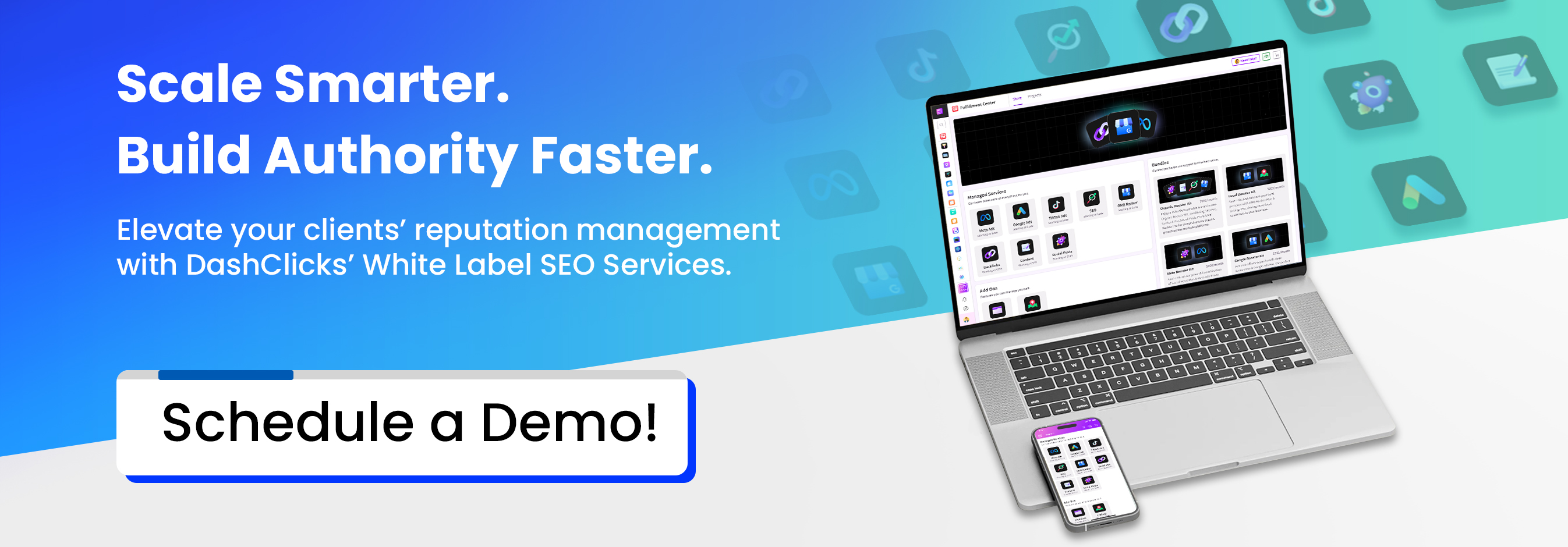

No results found.
Please try different keywords.
Get Started with
DashClicks Today
Get found online, convert leads faster, generate more revenue, and improve your reputation with our all-in-one platform.
.svg)
Unlimited Sub-Accounts
.svg)
Unlimited Users
.svg)
All Apps
.svg)
All Features
.svg)
White-Labeled
.svg)
Active Community
.svg)
Mobile App
.svg)
Live Support
.svg)
100+ Tutorials
.svg)
Unlimited Sub-Accounts
.svg)
Unlimited Users
.svg)
All Apps
.svg)
All Features
.svg)
White-Labeled
.svg)
Active Community
.svg)
Mobile App
.svg)
Live Support
.svg)
100+ Tutorials
.svg)
Unlimited Sub-Accounts
.svg)
Unlimited Users
.svg)
All Apps
.svg)
All Features
.svg)
White-Labeled
.svg)
Active Community
.svg)
Mobile App
.svg)
Live Support
.svg)
100+ Tutorials



.svg)
.svg)
.svg)
.svg)
.svg)


